REMEMBERING P. U. SUPPAN
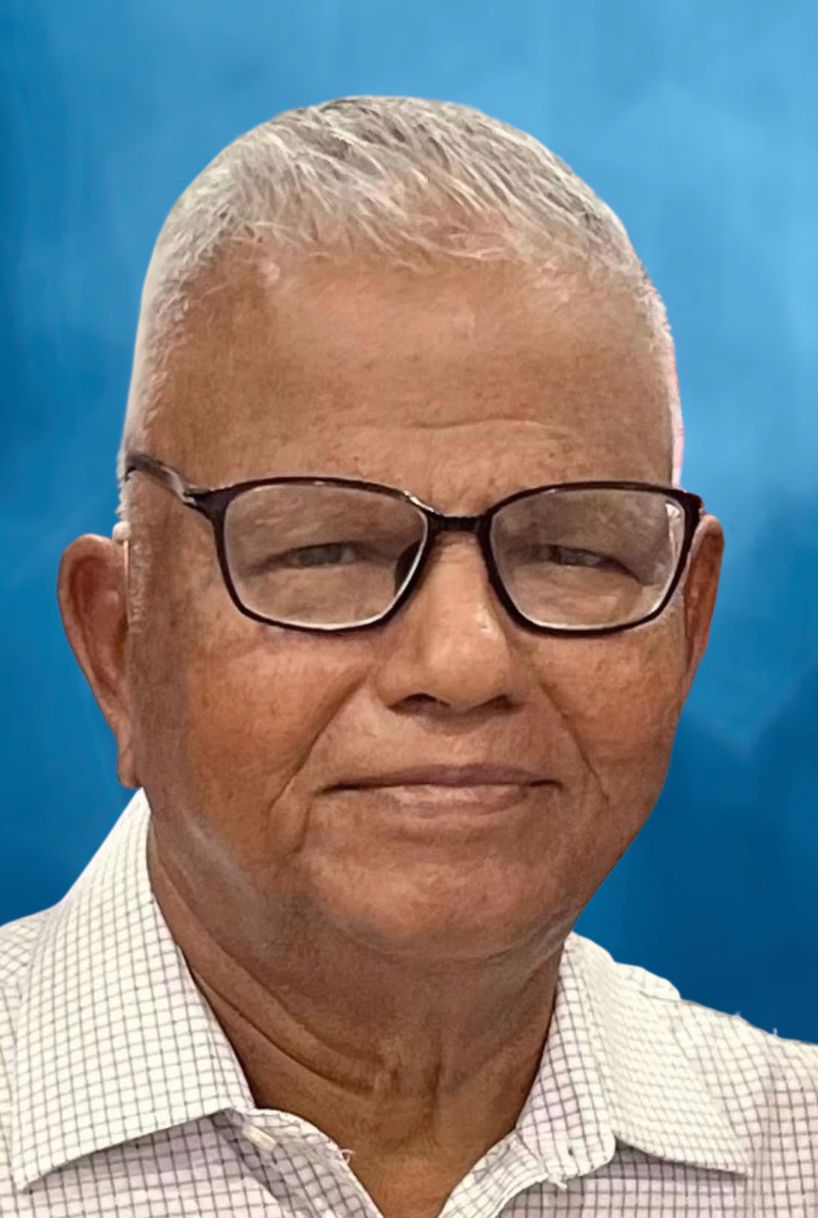
16 July 1939 – 6 September 2024
Suppan is one of the most recognizable names in the early history of the Faith in Malaysia. He deserves every praise for the quiet and yet most meritorious services he had rendered the Cause since 1964. The story highlights several early Bahá’í activities he had initiated during a time when the Faith was just taking root in Central Kedah, Malaysia. Mr. P. U. Suppan is very much synonymous with the growth of the Faith in the early days in Central Kedah. The history of the Faith in Central Kedah could never be written without adequate mention of the name of Suppan. This is a story of how one quiet worker for the Cause could achieve remarkable things in the field of service, leaving indelible footprints. It is yet another story of an unsung hero—celebrated here for the first time.
Suppan was born in Kinta Valley Estate near Batu Gajah town in Perak on 16 July 1939. In his childhood days he was called Allimuthu. From there he moved to stay with his late uncle Mr. M. Sinnathamby residing at the Kuala Muda Estate, K.M.S. Division near Sungei Petani town. While staying with his uncle, Suppan attended the Teachers Preparatory Examinations at the Saraswathy Tamil Primary School in Sungei Petani. That was a requirement to take up a teaching post. That was a two-year course, but Suppan cleared the examinations in first class within the first year as he was a brilliant candidate. Upon passing the examinations Suppan went to the State Education Department in Alor Setar to receive his appointment letter. Among the 25 others present to collect the appointment letters was Mr. V. Subramaniam, also known as V.S. Manaim who had also undergone his Teachers Preparatory Examinations in Penang. That was the first time Suppan and V.S. Maniam met, and they became instant friends. They then became trainee teachers whereby they attended weekend trainings in Sungei Petani while still teaching in their respective schools. In 1960, Suppan was posted as a teacher in the Kupang Estate Tamil Primary School in the district of Baling. V. S. Maniam was appointed teacher in the Alor Setar Public Tamil School. These two close friends used to meet up at each other’s places during weekends. In 1963 the house in which V.S. Maniam was living was completely destroyed by fire and many local friends came to his aid. Suppan who was in Kupang heard of this sad incident and took a public bus all the way from Kupang to Alor Setar. Suppan had brought with him new clothing including a few pieces of dhoti for V.S. Maniam. The latter was deeply moved and their friendship became stronger and lasted for life.
On 24 April 1964, V. S. Maniam accepted the Faith through Mr. S. Nagaratnam in Alor Setar. V.S. Maniam befriended one Y. Sahadevan of Kuala Muda Estate, K.M.S Division, the same estate where Mr. M. Sinnathamby was also residing. Sahadevan was s temporary teacher from 1964 to 1965 at the Alor Setar Public Tamil School, the same school where V.S. Maniam was also teaching. Maniam took Sahadevan to the teachers’ quarters of the Sultan Abdul Hamid College where Nagaratnam was staying. There Nagaratnam gave the teachings to Sahadevan who accepted the Faith. Both Sahadevan and Suppan used to visit the K.M.S. Division over weekends. It was in one of those visits to the K.M.S. Division that Sahadevan mentioned to Suppan briefly about the new Faith. That was the first time Suppan heard of the Bahá’í Faith. V.S. Maniam too travelled to Kupang specifically to share the Bahá’í Faith with Suppan. Suppan was already looking for some hope in his life, as he witnessed much disparity and divisions in the community he grew up. Although a believer in God, he loathed all those fossilized superstitions, outmoded practices and injustice prevalent in society. He was growing up as a forward-thinking person. When V. S. Maniam gave him the Faith, Suppan was very attracted to the principles of the Faith. He believed deep down that the Bahá’í Faith offered perfect solutions to a failing world that surrounded him. The forward- thinking Suppan went to Alor Setar and to meet up with Mr. Nagaratnam. After a long discussion, Suppan heartily and unhesitatingly embraced the Bahá’í Faith on 25 December 1964. That set in motion forces that would change the trajectory of his life. He became the key figure in Central Kedah for some 15 years. From then onwards, the teachings of the Faith became the centerpiece of Suppan’s life. He wasted no time in rising to serve the Cause with remarkable vigor, unwavering determination, dynamic and unstoppable energy. The first thing he did was to take along V. S. Maniam to give the Faith to his uncle M. Sinnathamby in the K.M.S. Division of the Kuala Muda Estate. The uncle accepted the Faith. and Suppan and V. S. Maniam then gave the Faith to many other youth in the same estate who also accepted the Faith. For Suppan, a new dynamism was set in motion in the field of teaching, which was not to cease till Suppan himself ceased to exist!
 Suppan is seated at the extreme right in this photograph taken with the teachers and students of the Kupang Estate Tamil School, 1961.
Suppan is seated at the extreme right in this photograph taken with the teachers and students of the Kupang Estate Tamil School, 1961.
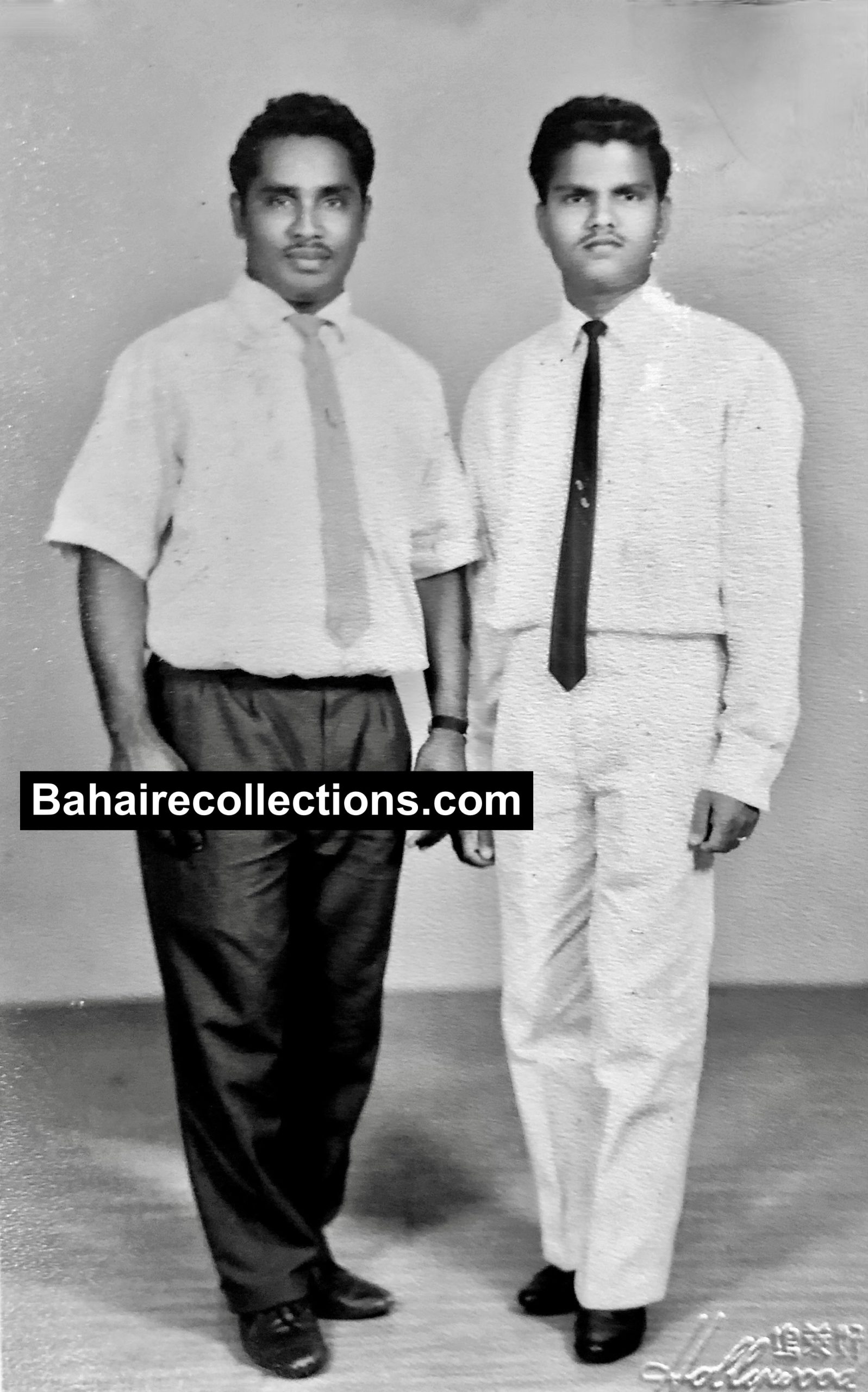
A young Suppan with Mr. Maniam, his dear friend from Tawar, near Baling town.
In January 1965, Suppan was transferred from Kupang Estate Tamil Primary School to the Arumugam Pillai Estate Tamil School in Sungei Petani, and rented a house at Belakang Hospital, a place at the back of the General Hospital of Sungei Petani. At the time of acceptance of the Faith, Suppan was a very popular writer of Tamil short stories for the Tamil dailies and dramas for Radio Malaysia. He was a promising and rising star who was on the forefront in the Tamil literary circles. Mr. Nagaratnam who saw Suppan’s meteoric rise as a prolific writer advised him to pay more attention to the business of Bahá’u’lláh – promoting His cause. He told Suppan that he could be either the best writer in the outside world or emerge as the best servant of Bahá’u’lláh within the Faith. Nagaratnam left it to Suppan to make the choice. Nagaratnam himself was a great Tamil short story writer in the 1960s but left that sphere to concentrate more on the Faith. Suppan who by this time had understood the mission of Bahá’u’lláh decided to go under the shelter of Bahá’u’lláh and dedicate his life for His cause. Despite taking a back stage in the Tamil literary circles, Suppan’s resourcefulness and talents were still very much sought after in the Tamil literary circles. Obliging them Suppan became one of the founding members and Chairman of the Kedah State Tamil Writers Association in 1970 and continued to write stories only at his leisure time. In 1984, the Tamil Writers Association of Malaysia awarded him with the “Best Short Story Writer Award”. Yet, serving the Cause continued to remain his priority. Suppan’s mastery of the Tamil language was truly boundless, which was channeled into the production of some early literary works for the Cause. Suppan was also an active member in the St. John’s Ambulance of Malaysia in his early days. Owing to the greater needs for manpower in the Faith, he slowed down and finally quitted the St. John’s Ambulance.
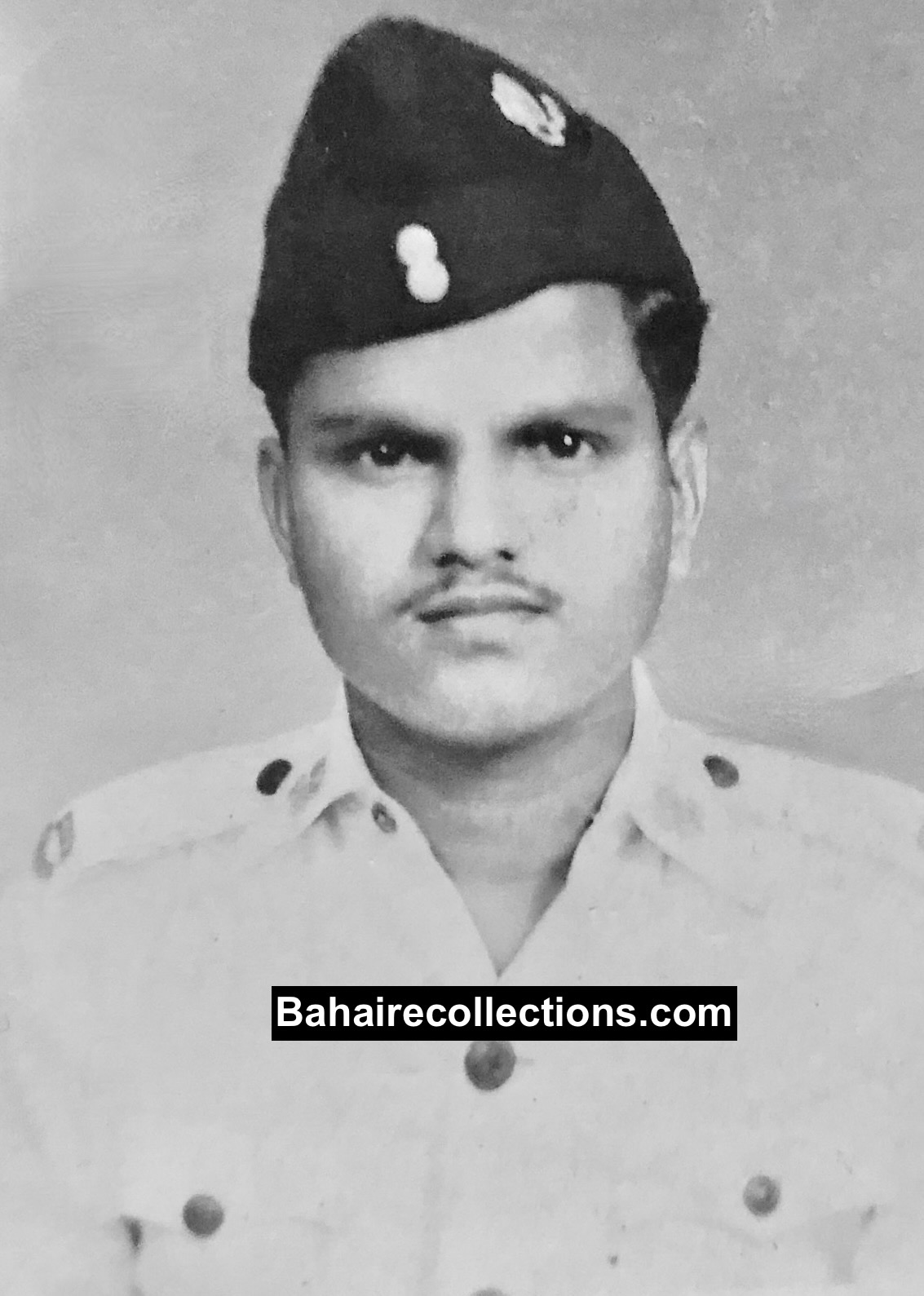
An active member with the St. John’s Ambulance, which he left to devote more time for the Faith.
Back to his early days. When Suppan was newly transferred to Sungei Petani, he then joined hands with a small band of English- speaking believers who had accepted the Faith before him through Mr. Nagaratnam. At that time, C. Ramanathan was the key Bahá’í who offered his residence 85-L at Jalan Pergam for Bahá’í activities. There used to be regular firesides from which many accepted the Faith. Suppan met up with them every Friday for firesides and other meetings.
Even as he accepted the Faith, Suppan was in the forefront of activities. He used to join activities in both Sungei Petani and Alor Setar. In Sungei Petani, he joined Ramanathan, and V. Nadarajan, a nephew of Nagaratnam, in cycling to the nearby Patani Para Estate and Scarboro Estate to teach the Faith. Also joining them were the youth of Kilang Lama Estate. Suppan was elected to the Local Spiritual Assembly of Sungei Petani in 1965. As the community was seen to be growing in strength, the Bahá’ís rented a hall in a small wooden house belonging to one Mr. Martin, a dispenser, for a monthly rental of M$15. It was in this hall that Nineteen Day Feasts, Holy Days and other Bahá’í meetings were held. When Mr. Hushmand Fatheazam, member of the Universal House of Justice came to Sungei Petani in August 1965, he was taken to this “Bahá’í Centre” which was nothing more than a hall with one table, one cupboard and a few chairs. Suppan was among the handful of Bahá’ís to welcome Mr. Hushmand Fatheazam.
When the time came for Suppan to get married, he had his marriage according to Bahá’í rites on 21 August 1965, the first Bahá’í wedding of Sungei Petani. It was held at the Gandhi Memorial Hall and conducted by Mr. S. Vasudevan, Secretary of the National Spiritual Assembly of Malaysia. Many Bahá’ís and non-Bahá’ís from several parts of the country attended this first Bahá’í wedding. Mrs. Shantha Sundram, editor of the Malaysian Bahá’í News drove some newly declared believers of Penang for the wedding. While only two hundred were expected, there was an air of excitement and curiosity in Sungei Petani, which led to an avalanche of uninvited guests into the hall, creating an acute shortage of food during the reception. The uninvited guests wanted to witness first-hand what a Bahá’í marriage was all about. That marriage drew unprecedented publicity for the Faith not only among the attendees, but among the residents of Sungei Petani as well. Nagaratnam who was a tower of strength for the believers in Kedah, was so impressed at the audacity of Suppan, that one month after Suppan’s wedding he threw a lunch at his residence for the newly wed, with Mr. Phung Woon Khing cooking the sumptuous dishes. V. S. Maniam was also present.
Suppan and a few other believers attended the State Level Teaching Conference held in Alor Setar in 1966. Regrettably, from 1967 onward, many English-speaking believers in the town began to retreat into the background and gradually drifted away from the Faith, unable to withstand the mounting opposition from the surrounding community. But Sungei Petani in Kedah and Klang town in Selangor had the highest concentration of Tamil speaking people. Much manpower was needed to take the Faith to this large concentration of Tamil-speaking people. Suppan coming from this community had to take a lead in taking the Cause to those people. He faced the greatest opposition from the Tamil-speaking community. Suppan, whose enthusiasm was always building to a crescendo was a lone-ranger and became known to the Malaysian believers and the institutions as the key figure and the primary engine in the growth and development of the Faith in Central Kedah from the mid 1960s.
The wider world tried its best to lure Suppan back into their fold. Individuals approached him and spoke to him at length at several occasions. Some delegations too visited him at his home to convince him to return to their fold. Suppan knew this was coming. He mastered the Tamil literature, Tamil folklore, Hindu epics and Hindu literature available in the Tamil language. Armed with this knowledge Suppan was at par with them, or even excelled above them. There was no way of winning Suppan over. As a believer Suppan was well equipped to meet anyone any time. From the early days Suppan carried a small notebook, in which he noted down important points when listening to elders in the Faith. In stages he built his own home Bahá’í library, and as Bahá’í materials became available in the Tamil language in the later years, he bought them and added to his collections. The books available in the Tamil language were The New Garden by Hushmand Fatheazam and Bahá’u’lláh and the New Era by John Esslemont. From 1965, the year the National Spiritual Assembly of Malaysia published its news organ- the Malaysian Bahá’í News magazine, Suppan subscribed to that to gain a deeper understanding of the Faith through its articles, and to keep abreast with the world affairs through its news content. More than that, the fire that was ignited in his heart by the love of Bahá’u’lláh was blazoning. Nothing in the world could assail him.
With the believers drifting away the issue of having a Bahá’í Centre became an issue. The first Bahá’í Centre at the residence of the dispenser Martin was abandoned. The newly married Suppan stepped in and offered his rented house at 15 G, Taman Kampong Baru, Poh Siong Park to be used as the Bahá’í Centre, in which the photographs of ‘Abdu’l-Bahá, Bahá’í Holy places and the Greatest Name were hung prominently for the first time. With most of the early believers of Sungei Petani keeping away from the Faith, Suppan needed moral support. The believers of Alor Setar, such as Nagaratnam, V. S. Maniam, Kesavanathan, Teh Teik Cheow, Mei Siew Hoong, and Kanniyah Adaikkalam came forward to assist Suppan in his efforts to bear the standard of Bahá’u’lláh. The Alor Setar youth who lent a hand to Sungei Petani at that time were R. Ganasa Murthi, R. Kanthakumar, Yin Hong Shuen, and Choo Yeok Boon. Groups of Bahá’ís from Alor Setar came to stay in Suppan’s house during weekends to assist in strengthening the Bahá’ís of Sungei Petani town and the surrounding estates. In 1966, Suppan moved to another house on the riverside in Taman Poh Siong at a time when the Local Spiritual Assembly had become weak. The house belonged to the owner of the Lim Ah Kow Press in Bakar Arang area. Suppan was doing part time job in the evenings as a Tamil composer at that press. The owner had a great liking for Suppan that he offered this house at a very cheap rent. But this house served as a Regional Bahá’í Centre for Central Kedah. Despite a feeble community, Feasts were still observed, and meetings of the Area Teaching Committee of Central Kedah were held regularly. Suppan threw a large-scale Naw-Rúz dinner for the first time in 1967 for which the Bahá’í youth of Kilang Lama Estate including T. Maniam and Ayahkannu were invited.

At the River Side house in 1967. Suppan in the middle is carrying his first born son, Thiagan. At the extreme left is Krishnan Sinniah and at the extreme right is Ayahkannu. Standing below is the author, Manisegaran.
As the needs of the Faith grew, in 1968, Suppan rented a spacious terrace house at 231-A, Jalan Kuala Ketil at a low-priced rate. The rent was cheap as it is situated right on the edge of Muslim cemetery. That house was constructed on an old Muslim cemetery. The owner himself moved to another house for discomfort, while Suppan comfortably moved in. This spacious house was a venue for several major Bahá’í activities. Long tables and long chairs were bought to organize big gatherings. Proper library facilities were arranged. It served as a hospice to many Bahá’í visitors from the surrounding estates. For the first time a prominent signboard was put with the artistic work of Kannaiyah Adaikkalam of Alor Setar who stayed with Suppan in this place until he left for pioneering to India in 1969. This Bahá’í Centre hosted a number of large scale Bahá’í core activities, such as children’s classes for the children of Kilang Lama Estate, firesides, Feasts and day-long deepening and fireside sessions, to name a few. This was the time when Suppan was an active member of the Area Teaching Committee of Central Kedah. Members of the Kedah State Teaching Committee like Nagaratnam, Teh Teik Cheow and V. S. Maniam met with the Area Teaching Committee of Central Kedah to discuss the systematic planning and growth of the Faith in this region.
The one most memorable event that Suppan always recalled was the members of the State Teaching Committee of Kedah organizing a large-scale public talk at the Gandhi Memorial Hall on 22 March 1969. That event faced unprecedented opposition and yet the believers became victorious. The topic of the public talk was “THE WORLD-ONE FAMILY”. The believers from Sungei Petani and the nearby Kilang Lama Estate rallied together, offering their unwavering support. With less than a week left they used Suppan’s house as a base and gathered in the evenings to get their posters and paste prepared. Posters on various designs and captions were hand-drawn by Kanniyah Adaikkalam from Alor Setar. Two days before the function the posters were put up at all the strategic places in Sungei Petani, such as bus stands, railway station, bus station, police station, traffic junctions, entrances to public places, hospitals, cinema theatres and on huge trees in strategic places. The whole town was decorated with these Bahá’í posters. By mornings many posters had been torn down by those who felt uncomfortable with the unprecedented publicity for the Faith. From midnight until dawn Bahá’ís were busy replacing posters. They would return to their base around 3:00 am. The Cathay cinema in the town too projected a slide of this public talk before the movies started. On 22 March 1969 about 100 people came for the public talk, though thousands had viewed the posters. Mr. Inbum Chinniah, Secretary of the National Spiritual Assembly of Malaysia gave a simple but powerful talk on the Faith with Nagaratnam translating into Tamil. While only a few Bahá’ís were involved in organizing the public talk, the general public felt that there was already a presence of a huge Bahá’í population in Sungei Petani. This was the work of a handful of believers from Sungei Petani and Kilang Lama Estate. Never before had so few in numbers had shaken an entire town population! That was one single event that came to be remembered well by Suppan. Taking note of the onward and resistless march of the Faith, many believers who had kept away from the Faith developed special fondness for Suppan. A few approached him and expressed their appreciation for Suppan’s steadfastness and of course confessed privately to him why they had to keep away from active involvement in the Faith.
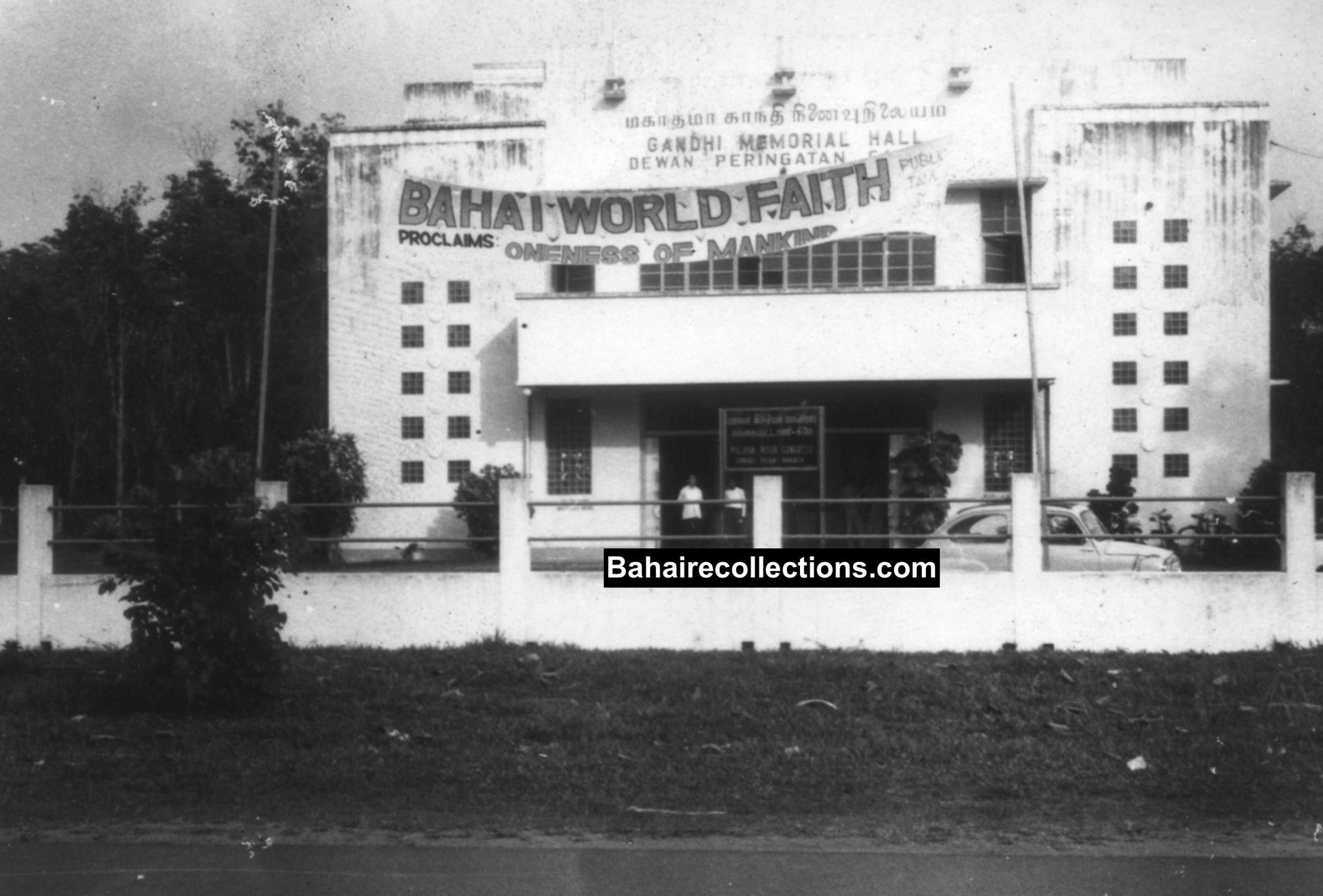
Banner on the Gandhi Memorial Hall of Sungei Petani, for the Public Talk on 22 March 1968–a big time event.
Suppan’s early journey in the Bahá’í Faith was fraught with challenges. He faced tremendous opposition from the community and was exposed to lots of criticism. In those days the few Tamil school teachers who accepted the Faith in the country came under heavy criticism. There used to be a widely and surely a wrongly held view that the Tamil School teachers were to be the vanguards of Hinduism, promoting and protecting their religion. The Tamil teachers belonging to the Islamic religion or Christian religion were spared out, but not the Bahá’ís who taught in Tamil schools. There were also several other Tamil School teachers who were unshakable in the Faith, such as Karuppiah in Muar, Kuppusamy in Jasin, Gopal and his wife Ganga in Dengkil, Veerasenan in Muar, V. S. Maniam in Alor Setar, Manickam who was teaching in Sungei Toh Pawang Estate near Bedong town, S. Krishnan in Kuala Muda Estate, and C. Subramaniam in Sungei Siput, to name a few. Teachers from the English and Tamil schools in Sungei Petani had embraced the Faith in considerably large numbers, but as a curtain of fear overcame them in the wake of rising opposition and criticisms they started to leave the Faith. However, a bold impulse got the better of Suppan, who fully understood that the ultimate victory of the Faith was inevitable. A clear-eyed Suppan stayed on in the Faith and braved the storm with exemplary courage. It may be difficult to believe, but yet a fact that those who left the Faith continued to have respect for Suppan and by extension to the Faith. Some did resort to ugly and cowardly tactics. There were a few years when anonymous letters were circulated about Suppan. Year after year he received anonymous greeting cards for Islamic Holy Days. Past midnight, stones were thrown on the roof of his house. There were times when he rode on motorbike to teach the Faith in the estates. And while the teaching was going on in a house, someone would dump a huge amount of salt into the fuel tank. And it was costly to get the engine to be overhauled. When he returned at night from a teaching trip, he would see broken bottles thrown on the path, hoping for his tyres to be punctured. He would get down from the motorbike and push it by avoiding the broken pieces of glasses on the roads. These were not to shake him up. He knew Whose Faith he was following and Who was his true Protector. Having understood the spirit and the mission of Bahá’u’lláh he was firm as a rock. Almost single handedly he became the champion builder in laying the foundation for the Faith in Sungei Petani in multiple ways. As time went by, Suppan won the respect and admiration of the community through the life that he led and the integrity he demonstrated in his private and public life.
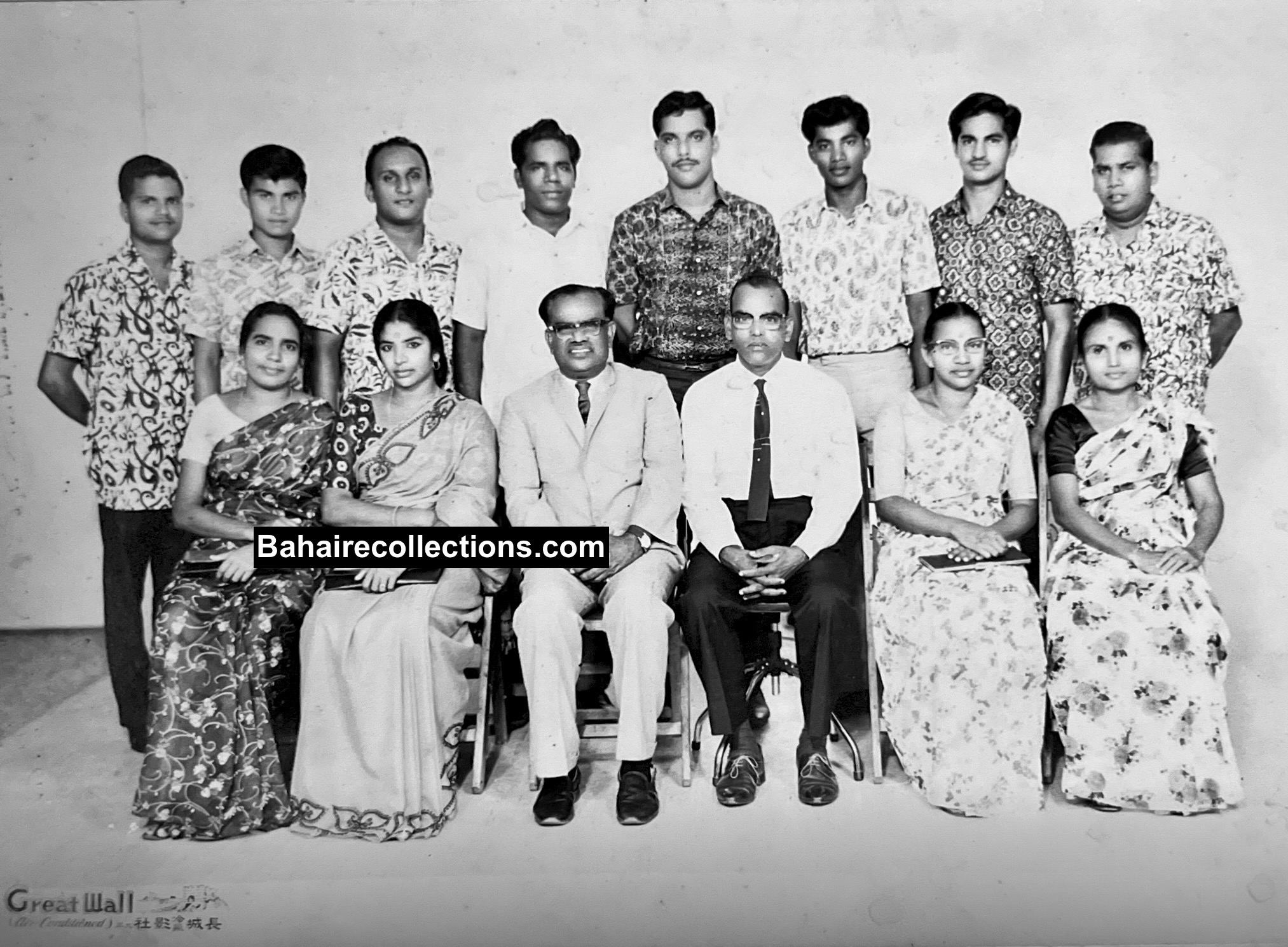 Suppan stands at the extreme left, among other teachers of the Arumugam Pillai Tamil Primary School in Sungei Petani. All of them became family members of Suppan, and developed the highest respect for him.
Suppan stands at the extreme left, among other teachers of the Arumugam Pillai Tamil Primary School in Sungei Petani. All of them became family members of Suppan, and developed the highest respect for him.
A number of factors catapulted Suppan into rising higher in the Faith. One was the support and strength he received from other elderly believers. Meeting the Hands of the Cause in the early days of his Bahá’í life was another important factor. He was one of those instrumental in making arrangements for the visit by Hand of the Cause of God Mr. Ṭarázu’lláh Samandarí and his grandson Soheil Samandarí. The meeting was arranged at the Central Kedah Hokkien Association building on 1 July 1966. The Hand recollected his meetings with Bahá’u’lláh, ‘Abdu’l-Bahá and the Guardian and inspired the believers. That was a watershed for the Bahá’ís of Sungei Petani, including Suppan.
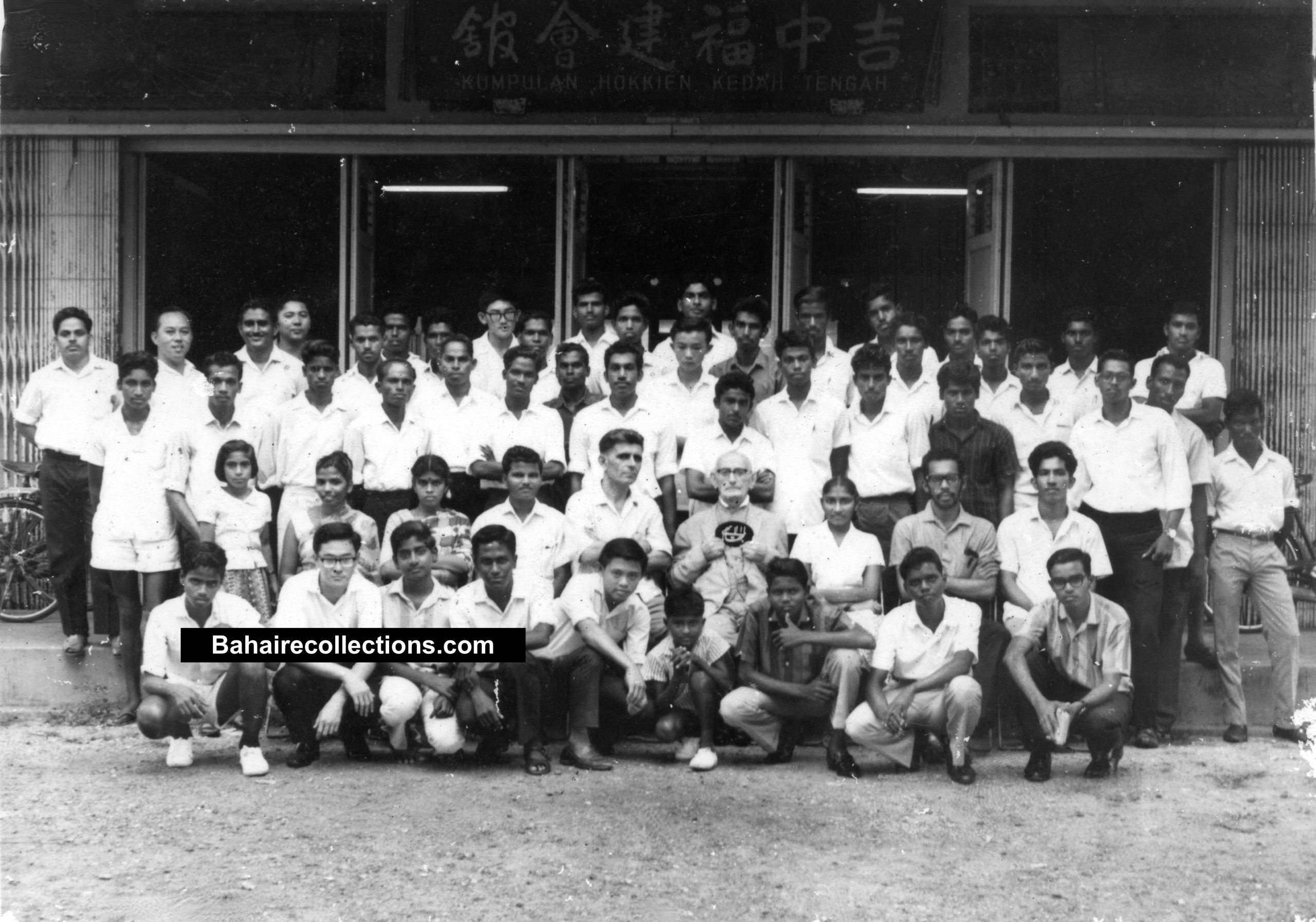 Visit by Hand of the Cause of God Ṭarázu’lláh Samandarí to Sungei Petani. Seated from R-L: S. Krishnan, C. Ramanathan, Janaki, Mr. Ṭarázu’lláh Samandarí, Soheil Samandarí, Suppan, Mrs. Suppan, Nurse Muniammah. Squatting at the extreme right is V. Theenathayalu with Ayahkannu next to him. The small boy squatting at the feet of Mr. Samandarí is the author Manisegaran, and squatting second from left is Teh Teik Cheow. Standing at the extreme left in the back row is M. S. Maniam with Phung Woon Khing next to him. Standing right at the back of Suppan is V. S. Maniam with Kesavanathan to his left. Standing tallest in the middle of the back row is S. Nagaratnam.
Visit by Hand of the Cause of God Ṭarázu’lláh Samandarí to Sungei Petani. Seated from R-L: S. Krishnan, C. Ramanathan, Janaki, Mr. Ṭarázu’lláh Samandarí, Soheil Samandarí, Suppan, Mrs. Suppan, Nurse Muniammah. Squatting at the extreme right is V. Theenathayalu with Ayahkannu next to him. The small boy squatting at the feet of Mr. Samandarí is the author Manisegaran, and squatting second from left is Teh Teik Cheow. Standing at the extreme left in the back row is M. S. Maniam with Phung Woon Khing next to him. Standing right at the back of Suppan is V. S. Maniam with Kesavanathan to his left. Standing tallest in the middle of the back row is S. Nagaratnam.
In 1968, Hand of the Cause Dr. Raḥmatu’lláh Muhájir visited his house, a defacto Bahá’í Centre too. Dr. Muhájir spoke about the many powers that Bahá’u’lláh had demonstrated in the world. He listed the names of the several kings who were removed from power, and elaborated on the several powers of transformation that Bahá’u’lláh had brought into the world to establish the Kingdom of God on the earth. After the short and effective talk, he went on to ask, as was his custom, about the teaching activities that the Bahá’ís carried out. When the Bahá’ís spoke about the Bahá’í activities in Central Kedah, he kept saying “Good! Good!” Finally, he spent some time inspiring the Bahá’ís to go teaching. In December 1968, he met Hand of the Cause Abu’l-Qásim Faizí at the official opening of the Alor Setar Bahá’í Centre. The talks by these Hands created a big impact within his soul. There were also several visiting Bahá’ís whom he met. One visitor of arresting personality was Miss Jeanne Frankel from the USA who became a Knight of Bahá’u’lláh for pioneering to Nicobar Island. She visited Suppan at his residence in June 1968. Mr. Yankee Leong, the first enlightened believer in Malaya was yet another with whom he associated closely in the early days. A few, but important national gatherings especially the National Conventions that he attended in the early days demonstrated that unity among the believers is not a utopia. He found true unity prevailing among the believers, something he had not witnessed elsewhere.
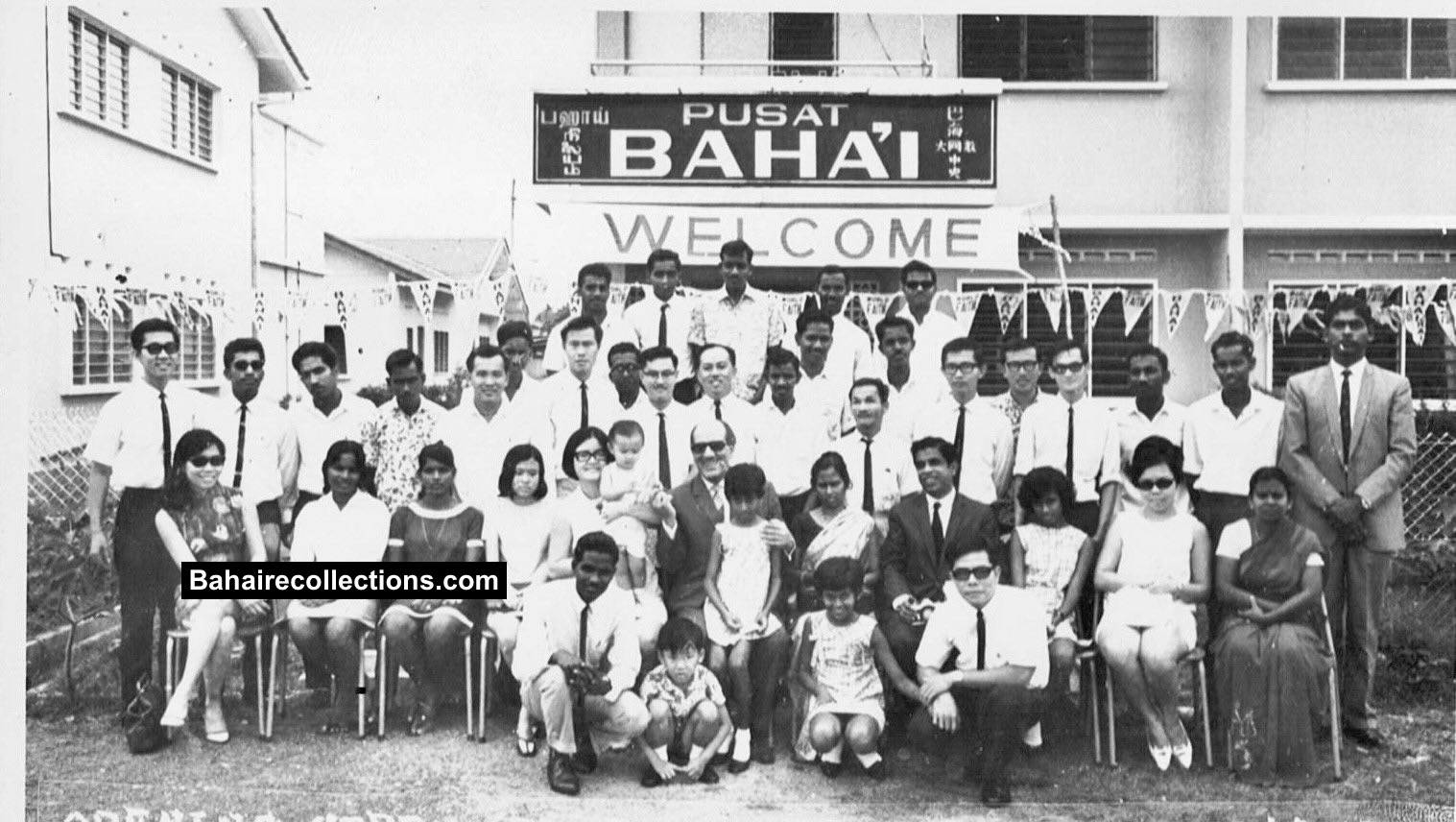 Official Opening of the Alor Setar Bahá’í Centre by Hand of the Cause of God Abu’l-Qásim Faizí, seated in the centre. Suppan stands at the extreme right at the back row, with Kanniyah Adaikkalam next to him.
Official Opening of the Alor Setar Bahá’í Centre by Hand of the Cause of God Abu’l-Qásim Faizí, seated in the centre. Suppan stands at the extreme right at the back row, with Kanniyah Adaikkalam next to him.
The very involvement in teaching activities itself was a strengthening process for many. When the town people became less receptive, focus went on nearby estates. Suppan, in league with the visiting believers of Alor Setar visited many estates in Central Kedah for teaching or deepening of the new believers. Most, if not all these estates have given way for development and remain in history alone. Suppan was one of those key believers who was instrumental opening up for the Faith more than fifty rubber estates and villages in Kedah state which no more exist today. The estates that Suppan and other believers visited in Kedah were Badenoch Estate, Sungei Tawar Estate, Baling Estate, Malakoff Estate, Batu Putih Estate, Tanah Merah Estate, BMR Estate, Pelam Estate, Bukit Sembilan Estate, Sungei Ular Estate, Anak Kulim Estate, Ghim Khoon Estate, Dublin Estate, Somme Estate in the Baling-Kulim belt. The Harvard Process Estate, Sungei Toh Pawang Estate, Sungei Getah Estate, Arumugam Pillai Estate, Soon Lee Estate, Thye Lai Estate, Patani Para Estate, Sungei Para Estate and the Sungei Tukang Estate were the main estates in the Alor-Star-Sungei Petani belt. The Kuala Muda Estate, Lubok Segintah and Scarboro Estate were the main estates in the Sungei Petani-Kuala Ketil belt. The early Bahá’ís of Sungei Petani did not have any vehicle and so they went teaching on bicycles or public transportation. At a later stage the Faith was taken to the towns of Baling, Kulim, Lunas, Gurun, Tanjung Dawai, Bedong, Sungei Lalang, Kuala Ketil, Grik, Klian Intan, Sik, Selama and Serdang (Kedah). Suppan bought his first motorcycle -a Honda 50 model in 1969, and his first car – a used car in 1979. It was from the late 1980s that he started to buy new cars. And all these vehicles were used to serve the Faith.
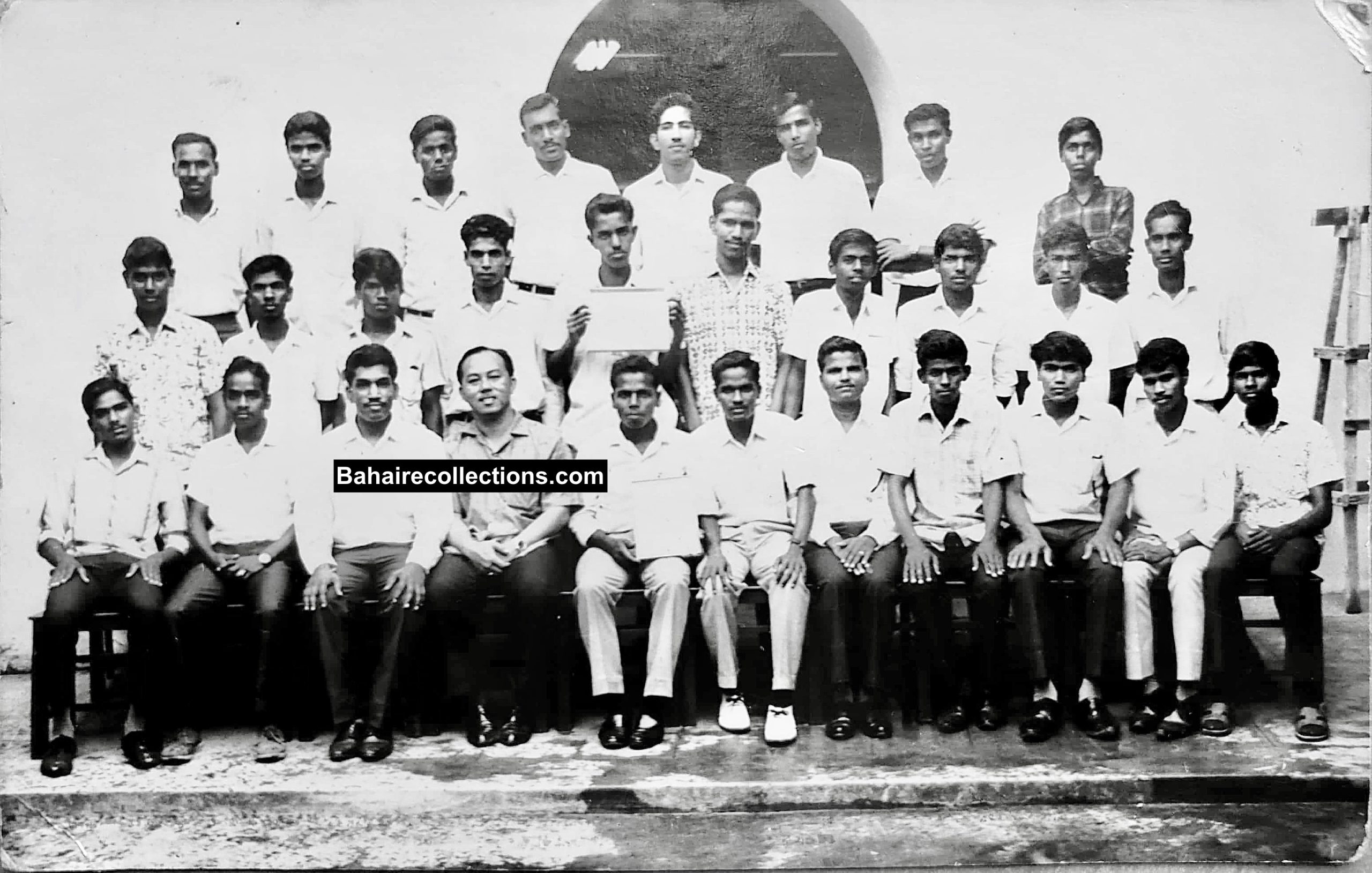 Conference for the newly declared believers Tamil speaking friends held in Kulim town in 1968. Suppan is seated fifth from right and to his right are V. S. Maniam, Birkhan, Phung Woon Khing, and Kesavanathan. Holding the Greatest Name in the back row is N. Ramasamy with T. Maniam to his left. Standing at the extreme left in the back row is Kanniyah Adaikkalam. At the centre of the back row is S. Krishnan with Arul Sivanathan to his right.
Conference for the newly declared believers Tamil speaking friends held in Kulim town in 1968. Suppan is seated fifth from right and to his right are V. S. Maniam, Birkhan, Phung Woon Khing, and Kesavanathan. Holding the Greatest Name in the back row is N. Ramasamy with T. Maniam to his left. Standing at the extreme left in the back row is Kanniyah Adaikkalam. At the centre of the back row is S. Krishnan with Arul Sivanathan to his right.
As the estate teaching came to be intensified the newly enrolled believers had to be consolidated. It was a blessing that Mr. Krishnan Sinniah, a teacher at the Kuala Muda Estate accepted the Faith in 1966 and he became a great asset in the development of the Faith in Sungei Petani.
The believers around Sungei Petani had swelled to about 200 in early 1966. The strength and inspiration of the Sungei Petani Bahá’í community came largely from the teaching conferences held regularly at the Sungei Petani Private High School. At these conferences, very interesting talks were given on the basics of the Bahá’í teachings, success stories were shared, and visitors to the community were brought to inspire the crowd. The most important conferences were held in December 1965, February 1966, May 1966 and May 1967. Physical arrangements fell upon Suppan, who booked that school for the gatherings. The usual speakers were S. Nagaratnam, Suppan, and V. S. Maniam. Chinese speaking believers like Mr. Phung Woon Khing and Yin Hong Shuen spent time with the Tamil speaking friends in order to encourage them. The Penang Bahá’ís would be invited from time to time to inspire the friends. Yankee Leong from Seremban and Leong That Chee, Raymond Peter and S. Sathasivam from Malacca would join these conferences whenever passing through on their trips to Alor Setar. After these conferences they would also be taken to teach the Faith to some prominent figures in the town And the old believers still remember how Suppan used to prepare tea for the break sessions- from a stove made from brick stones at the back of the Private School. Kettle, tea bags, sugar, milk and biscuits for tea breaks were brought from Suppan’s house. Suppan also took care of arranging lunch for the participants, usually bread with chicken curry prepared by his wife. His house was just a walking distance away.
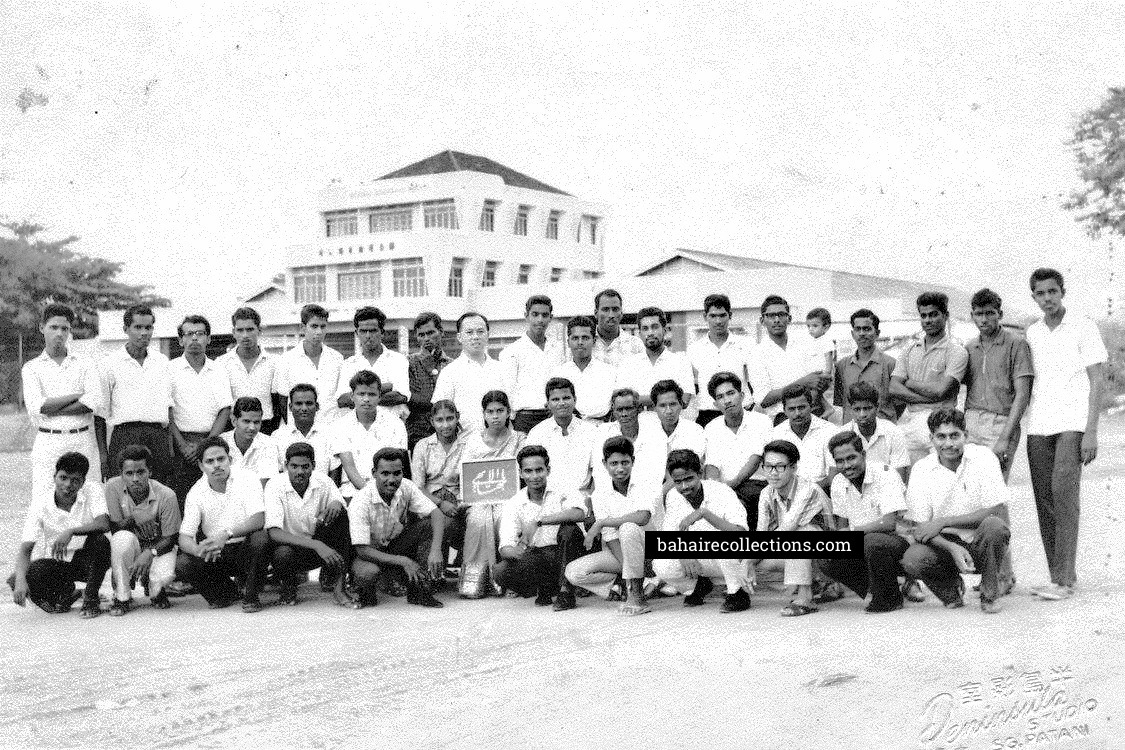 Sungei Petani Teaching Conference held at the Private High School on 12 May 1967. Suppan is seated in the centre with his wife holding the Greatest Name, to his right. Seated next to his wife is his sister Janaki. Nagaratnam is squatting at the extreme right, with V. S. Maniam next to him. Flanking the Greatest Name are R. Ganasa Murthi to the right and Kanniyah Adaikkalam to the left. Seated third from right is Krishnan Sinniah. Phung Woon Khing is in the middle of the back row, in white.
Sungei Petani Teaching Conference held at the Private High School on 12 May 1967. Suppan is seated in the centre with his wife holding the Greatest Name, to his right. Seated next to his wife is his sister Janaki. Nagaratnam is squatting at the extreme right, with V. S. Maniam next to him. Flanking the Greatest Name are R. Ganasa Murthi to the right and Kanniyah Adaikkalam to the left. Seated third from right is Krishnan Sinniah. Phung Woon Khing is in the middle of the back row, in white.
On an average, some 50 to 60 believers and enquirers turned up at these conferences. These teaching conferences had a two-fold purpose. One was to round up the new believers and deepen them through talks and question- answer sessions. The other was to plan for the next wave of teaching activities. The conferences did achieve these desired results.
There were moments Suppan used to visit the dormant believers at their homes to bring them back to the mainstream of activities. He used to employ unimaginable and most unexpected tactics to lure them. There was one incident where a believer and a very close friend of Suppan who did not come for some time. Suppan met him at the friend’s home and inquired as to why he did not come for activities for some time. When the friend gave all kinds of excuses, Suppan told him, “No problem. I fully understand. We shall have the next meeting at your home. About twenty believers will be coming. Please do not forget to organize tea and biscuits for the meeting”. That friend immediately replied, “Please do not trouble yourselves. I shall be there at the next meeting”. That believer started coming for meetings. But Suppan did not employ this approach for long. He used to say that the Faith is purely voluntary and true loss is indeed for those who wish to be left out.
SOME RESPONSIBILITIES
As a Tamil school teacher, Suppan was able to contribute for the development of Bahá’í literature in the Tamil language in the early days. In 1971 a National Tamil Literature Unit was formed, with its base in Alor Setar. Apart from Suppan other members were S. Nagaratnam, S. Krishnan, V.S. Maniam and R. Kanniappan. On 5 August 1971 it released a booklet “Laws and Teachings of Bahá’u’lláh” which delighted the Tamil-speaking community. This was a major achievement for the Cause, as the Tamil-speaking community in Malaysia was able to learn something of the laws of the Faith for the first time. This unit also issued new translations of Tamil Prayer books. One more book released by this Unit was the translation of “Bahá’í Spiritual Community-Three Steps” in 1971. This too was well received by the Tamil speaking Bahá’ís. Pocket-sized prayer books were published in Tamil in 1973. In 1972 “Oli Uthayam” the first Tamil Bahá’í monthly, with publication permit from the Ministry of Home Affairs was printed and issued from Alor Setar. The Editorial Board was made up of S. Nagaratnam, S. Krishnan, Suppan, M. Shanmugam and V. S. Maniam. This newsletter ran for about 4 years. While its cover was printed, the contents were stenciled.
From 1967 Suppan went as a delegate for the National Bahá’í Convention and continued to be elected delegate for several years. He and Kanniyah Adaikkalam hitch-hiked from Sungei Petani to Kuala Lumpur for this Convention of 1967. Effective 1967 Suppan served as an able Treasurer of the Regional Teaching Committee for more than a decade. He used to be very strict with money in sending out field teachers. Suppan knew the exact bus fares to most of the destinations. He would give the exact bus fare and another 20 cents for, with a caution statement, “The estate folks are very simple and most loving people. If they invite you into their homes, they would surely serve tea. And if they serve tea, please return the 20 cents, as the money belongs to Bahá’u’lláh”. In their casual conversations, the field teachers like Ayahkannu and Mayil Muniandy from Kilang Lama Estate, and Thannimalai from Scarboro Estate often recollected this position that Suppan took–with pride of course!
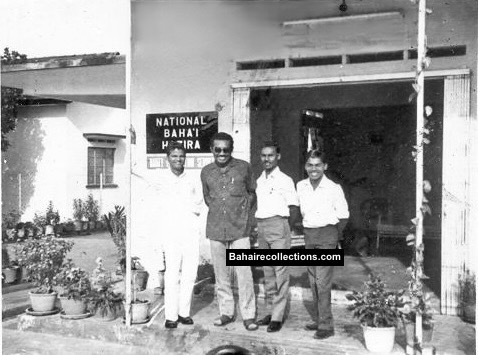
At the National Bahá’í Centre in Setapak, Kuala Lumpur, 1967. L-R: Suppan, Raymond Peter, Kanniyah Adaikkalam and Sandrakasan.
In 1972, Suppan joined Kesavanathan, S. Krishnan, Mayil Muniandy and the author in undertaking a two-week travel teaching throughout the state of Malacca on the request of the National Teaching Committee, to activate the dormant communities as the state of affairs of the Faith throughout the estates in Malacca had dipped considerably.
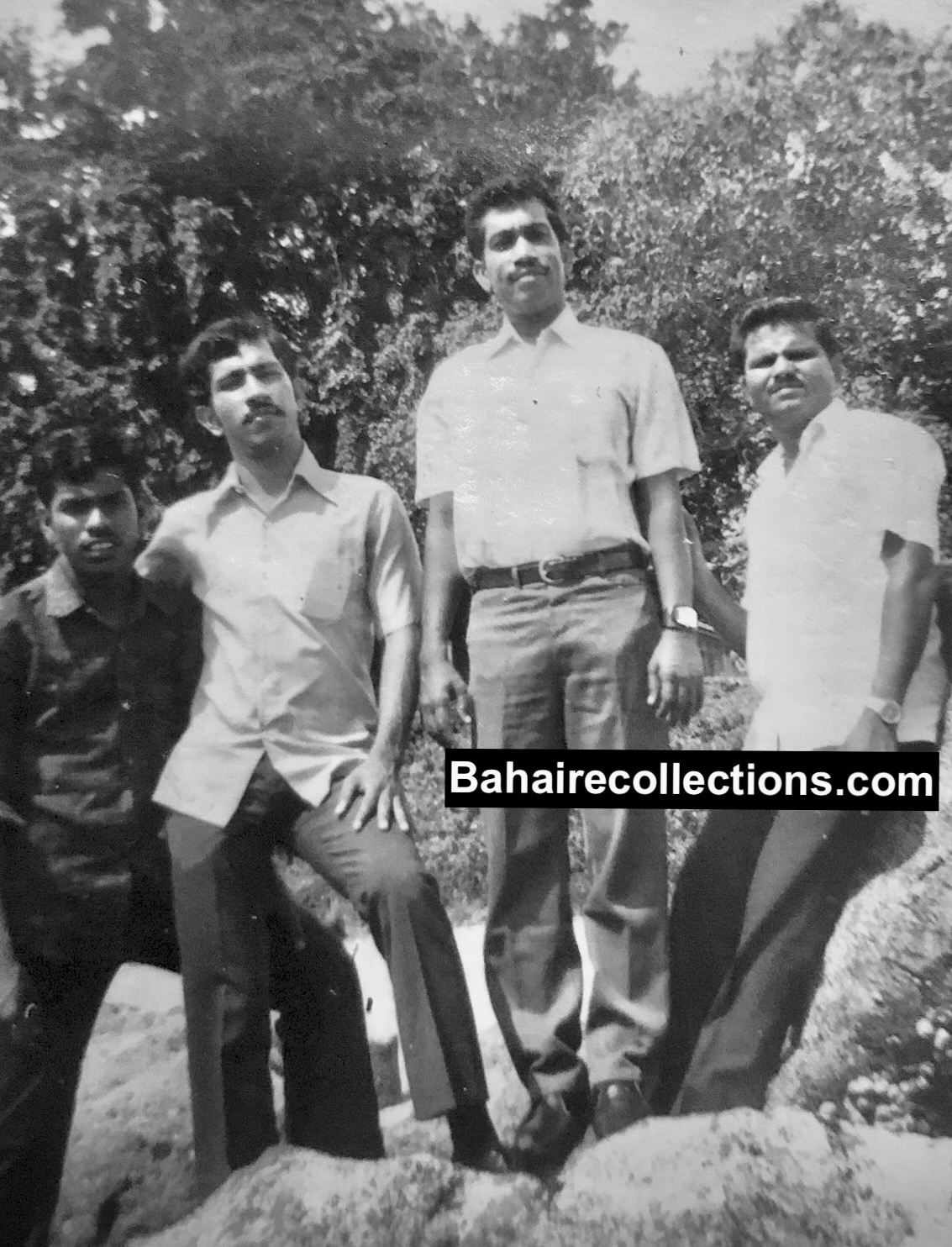
Travel teaching in Malacca, December 1972. L-R: Mayil Muniandy, S. Krishnan, Kesavanathan and Suppan.
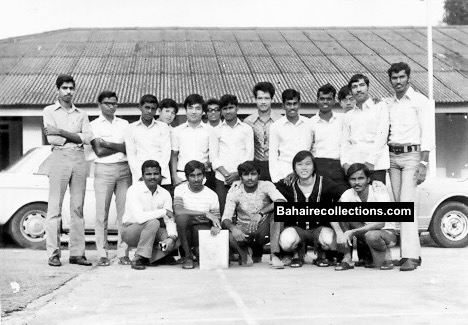
Winter School at Johor Bahru, December 1972. Suppan is squatting at the extreme left. S. Krishnan stands second from right.
In 1985, he undertook a one-month travel teaching to Tamil Nadu on the request of Counselor Nagaratnam who was residing in Chennai city, Tamil Nadu. Suppan gave impactful talks with his fluent Tamil language in many communities he visited and taught the Faith in many villages. He won the praises from Counselor Nagaratnam and the State Bahá’í Council of Tamil Nadu. Upon returning to Malaysia, he commented that Tamil Nadu needed much manpower, and he desired to make more trips. But domestic situation did not enable him. It was only in December 1996, before attending the first decade of the inauguration of the Bahá’í House of Worship in New Delhi that he was able to visit along with his wife and other friends of Malaysia places including Kanchipuram, Coimbatore, Ooty, Mahabalipuram, Madurai, Sivakasi, and Kanyakumari in Tamil Nadu and Kerala State and involved in teaching activities and consolidation of believers there.
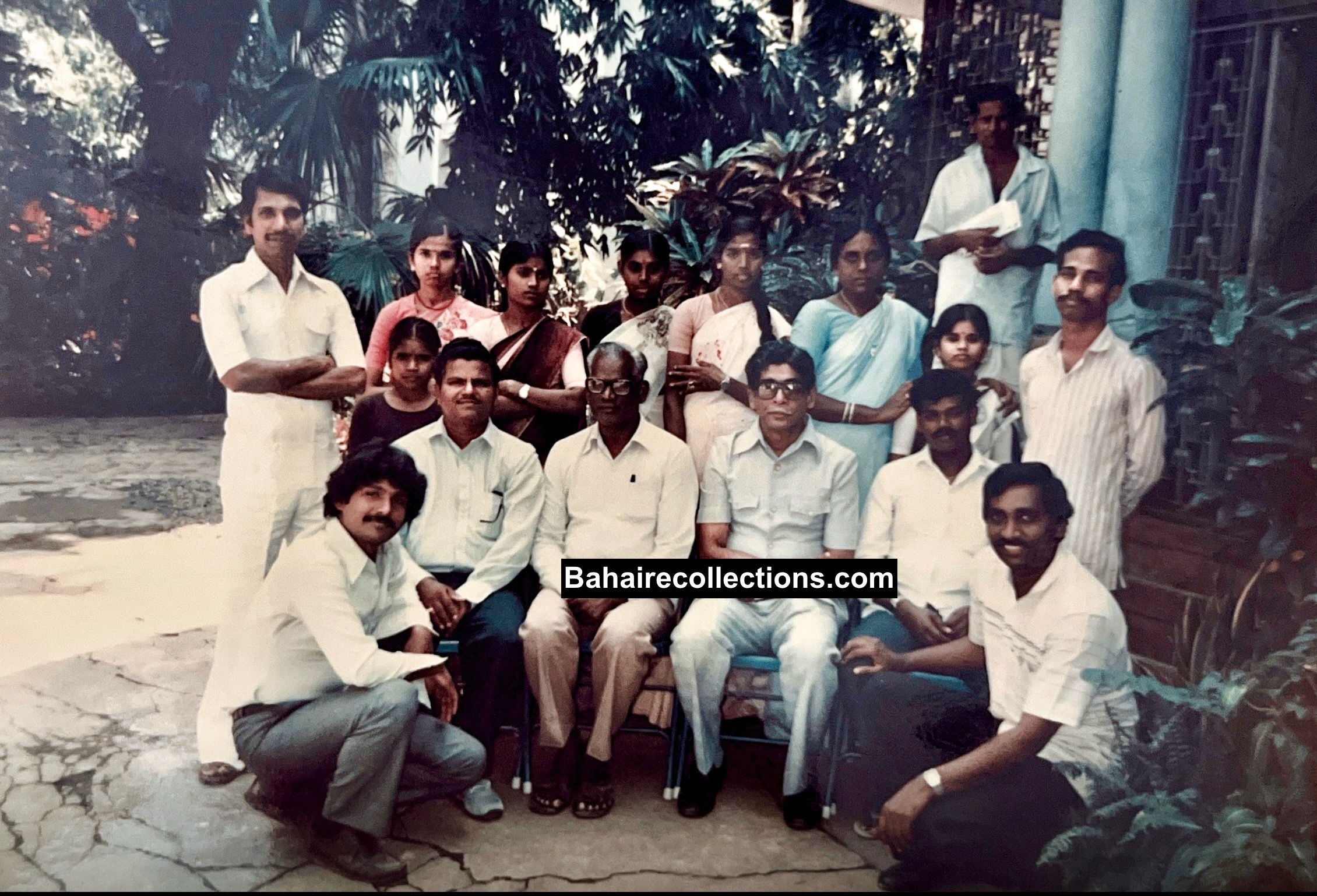 In front of the Bahá’í Centre of Chennai, 1985. Seated L-R: Suppan, R. Perumal from Vellore, Counselor S. Nagaratnam, Lingam. Squatting at left is Selvakumar from Trichy and at right is Mayisveren. Standing at the extreme left is Gunasekaran, Secretary of the State Bahá’í Council of Tamil Nadu. Standing at the extreme right is Ganesan, care taker of the Centre.
In front of the Bahá’í Centre of Chennai, 1985. Seated L-R: Suppan, R. Perumal from Vellore, Counselor S. Nagaratnam, Lingam. Squatting at left is Selvakumar from Trichy and at right is Mayisveren. Standing at the extreme left is Gunasekaran, Secretary of the State Bahá’í Council of Tamil Nadu. Standing at the extreme right is Ganesan, care taker of the Centre.
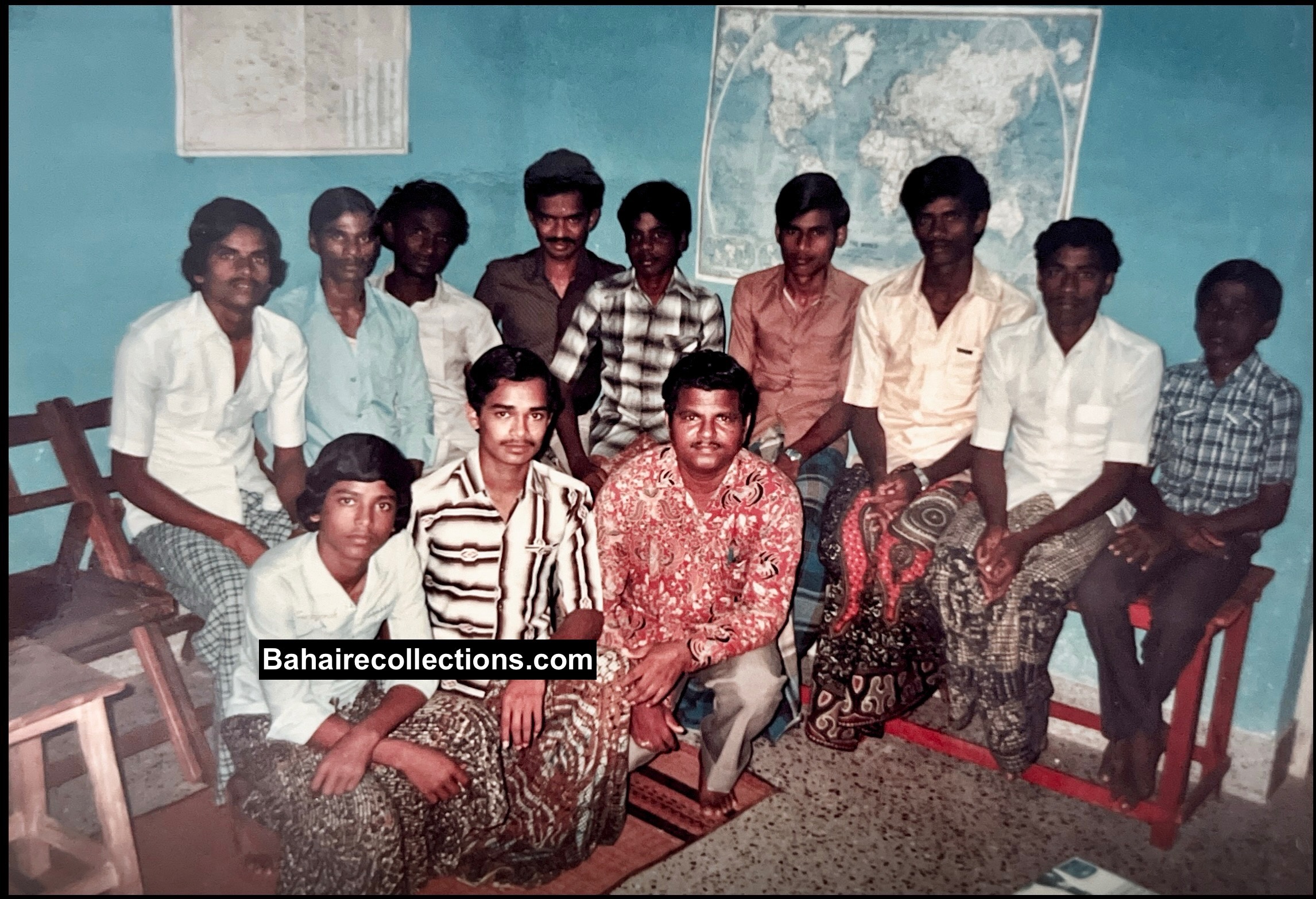 Suppan squatting at the extreme right, at a visit to a community in Tamil Nadu.
Suppan squatting at the extreme right, at a visit to a community in Tamil Nadu.
RISE OF A NEW GENERATION
In 1969 Suppan bought a piece of land from the National Land Finance Co-operative Society situated at the peripherals of the nearby Sungei Tukang estate and erected his own house. In about September that year Suppan started to live in that house near Sungei Tukang Estate. There were already a few people who had accepted the Faith through earler teaching attempts. But Suppan was back to his energetic action. He placed hundreds of Bahá’í pamphlets in the Tamil language at the grocery shop there. Mr. Karuppiah, the owner of the grocery shop was his old friend in Kupang. Whoever came to this shop returned with those pamphlets. Through this, along with door-to-door teaching, by Suppan’s sister Janaki and Miss Anjalai from Kilang Lama Estate, the entire estate was carpeted with the Bahá’í Teachings. Mr. S. Krishnan of Kuala Muda Estate too did teach the Faith in his teaching trips to this estate. K. Muthiah of Sungei Petani town spoke at a fireside held in Suppan’s house and a few youth accepted the Faith. Immediately a local youth committee was formed. Before they could be consolidated, an influential community leader in the estate dissuaded them. As the only Bahá’í family in that estate they received some criticism from some quarters, and yet Suppan being Suppan, he moved on unrestrained as the wind. Those who had accepted the Faith did not show keen interest in joining for activities. But Sungei Petani town needed manpower to keep the Faith active and alive. While still residing in Sungei Petani, Suppan threw his support behind Sungei Petani. The State Teaching Committee held some of its meetings in Suppan’s house in this estate.
In 1971, Hand of the Cause of God Dr. Muhájir had urged the Bahá’ís to print one million Bahá’í pamphlets in the local languages and take them to every village, and town in Malaysia by what was called the Main Road Plan. Sungei Petani did not have manpower and Suppan came to assist. He joined the handful of other believers such as Leong Foo Chong from Alor Setar who had settled in this town, S. Krishnan, a youth K. Varatharajoo and the author to distribute the Bahá’í pamphlets over a period of three days in the Chinese, English and Tamil languages. The entire downtown Sungei Petani was carpeted with the pamphlets.
But while residing in Sungei Petani, Suppan had rented three different houses which were used as Bahá’í Centres. That itself became a huge responsibility for him. Each month he had to buy groceries for his family as well as for gatherings held in the three centres. This financial burden faced was a joy as he would recall later. From Sungei Tukang Estate Suppan moved to Sungei Lalang town in 1975.
In 1975, a wooden house was rented in Jalan Kuala Ketil of Sungei Petani as the Bahá’í Centre. When Nagaratnam transferred from Alor Setar to Sungei Petani in January 1976, he offered his house at 116 A, Taman Bunga Raya (Lorong Satu) for a regular meetings place. With the encouragement of Dr. Muhájir, in 1977 the believers in Sungei Petani were able to purchase a semi-detached single storey bungalow at 14 Taman Sejati, off Jalan Sekerat to serve as a Regional Bahá’í Centre for 25 Local Spiritual Assemblies in the Kuala Muda District.
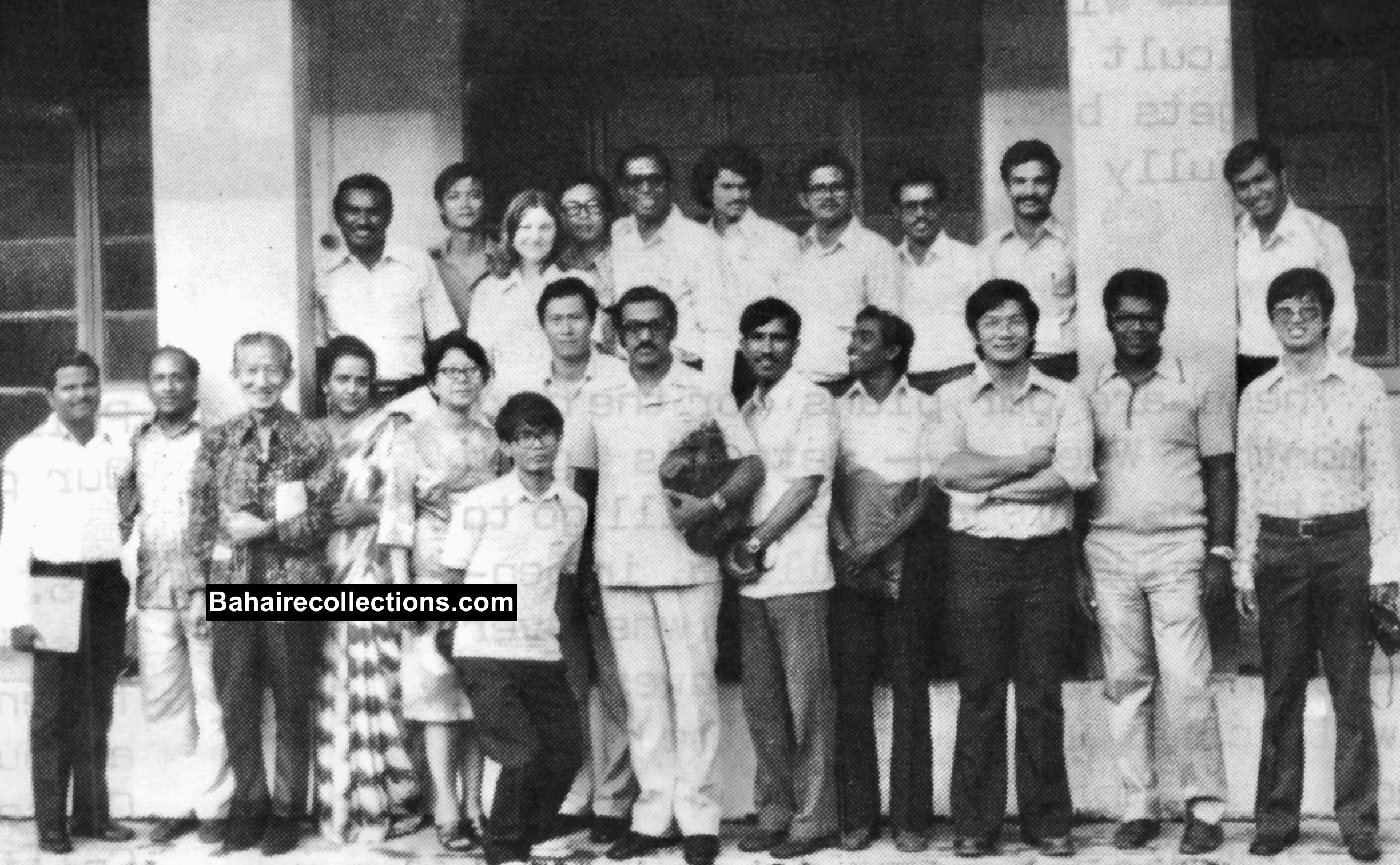 Summer School held in Alor Setar in 1976.Standing front row L-R: Suppan, C. Subramaniam, Yankee Leong, Shantha Sundram, Theresa Chee, Soh Aik Leng, Mei Siew Hoong, Dr. M. M. Sreenivasan, S. Krishnan, G. Kuppusamy, Chua Tek Wee, N. Nagendran and Chong Boo Haw. Back row L-R: Raymond Peter, Wong Boon Tock, Jennine Renaud, Wong Meng Fook, Inbum Chinniah, Anantha Krishnan, Rama Naidu, G. A. Naidu, D. Vythinathan and Kanna Baran.
Summer School held in Alor Setar in 1976.Standing front row L-R: Suppan, C. Subramaniam, Yankee Leong, Shantha Sundram, Theresa Chee, Soh Aik Leng, Mei Siew Hoong, Dr. M. M. Sreenivasan, S. Krishnan, G. Kuppusamy, Chua Tek Wee, N. Nagendran and Chong Boo Haw. Back row L-R: Raymond Peter, Wong Boon Tock, Jennine Renaud, Wong Meng Fook, Inbum Chinniah, Anantha Krishnan, Rama Naidu, G. A. Naidu, D. Vythinathan and Kanna Baran.
Suppan came back to Sungei Petani town in 1982, by which time he saw the younger generation holding the baton. He served on the Local Spiritual Assembly from 1982 till 1992. He left the Assembly the longest serving member during his time. Even while on the Assembly, from 1983 onwards he served as Assistant Registrar of Bahá’í Marriages and solemnized 54 Bahá’í marriages during his tenure.
In 1985 the Universal House of Justice released the Promise of World Peace Statement to the peoples of the world. Suppan joined other Assembly members in distributing the statement to those leaders and eminently placed people in Sungei Petani. As the one living in Sungei Petani since 1965, Suppan knew most of the leaders of the town and took a prominent role in distributing the statement to them.
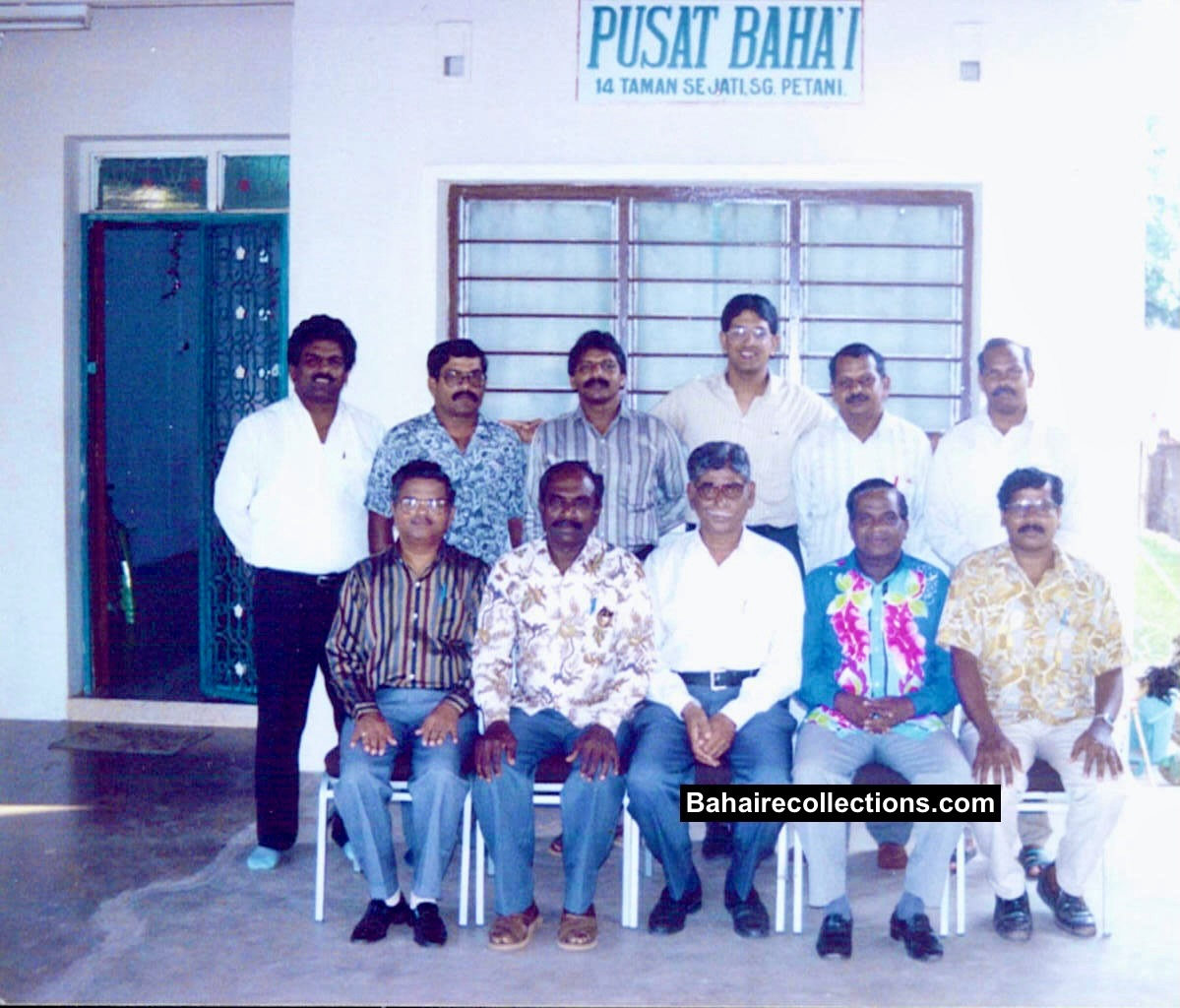 A group of believers in Sungei Petani in 1985. Seated L-R: Suppan, Ramayah, Nagaratnam, V. S. Maniam and B. Suppiah. Standing L-R: K. Selvarajoo, Muniandy Raju, Poongavanam (Babu), Nagen Marimuthu, Kandiah Raju and Arputhaseelan.
A group of believers in Sungei Petani in 1985. Seated L-R: Suppan, Ramayah, Nagaratnam, V. S. Maniam and B. Suppiah. Standing L-R: K. Selvarajoo, Muniandy Raju, Poongavanam (Babu), Nagen Marimuthu, Kandiah Raju and Arputhaseelan.
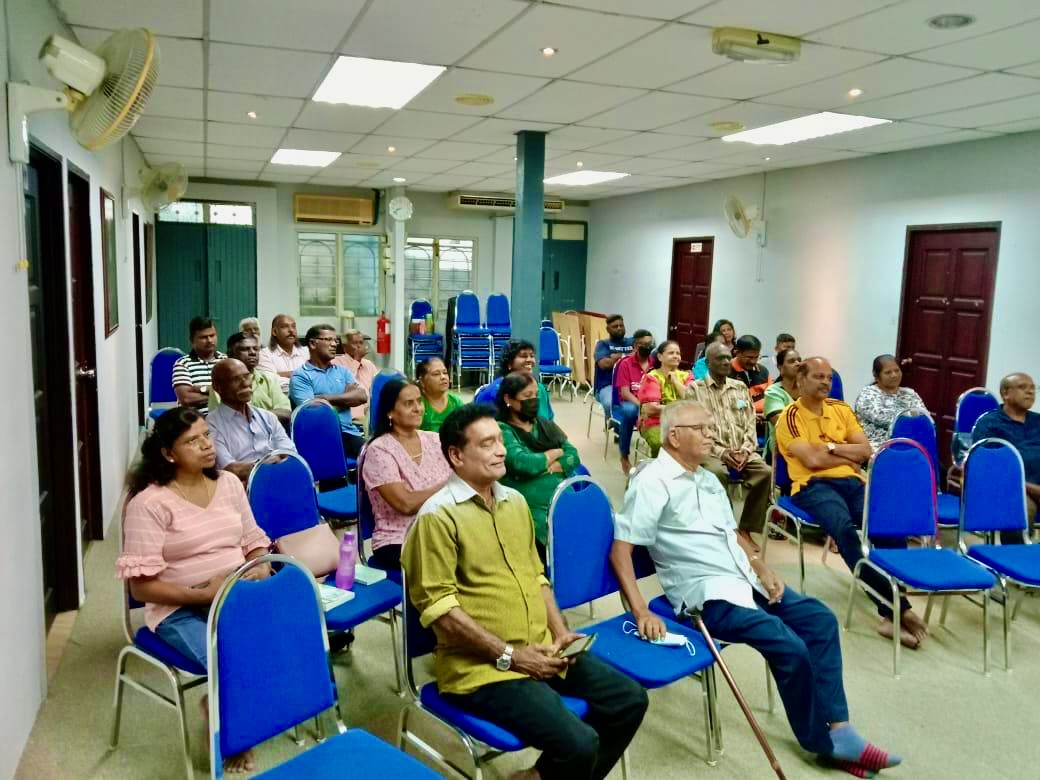 Gathering in the Bahá’í Centre of Sungai Petani in February 2023. Suppan with a walking stick is seated at right and to the left is K. Tharmalingam.
Gathering in the Bahá’í Centre of Sungai Petani in February 2023. Suppan with a walking stick is seated at right and to the left is K. Tharmalingam.
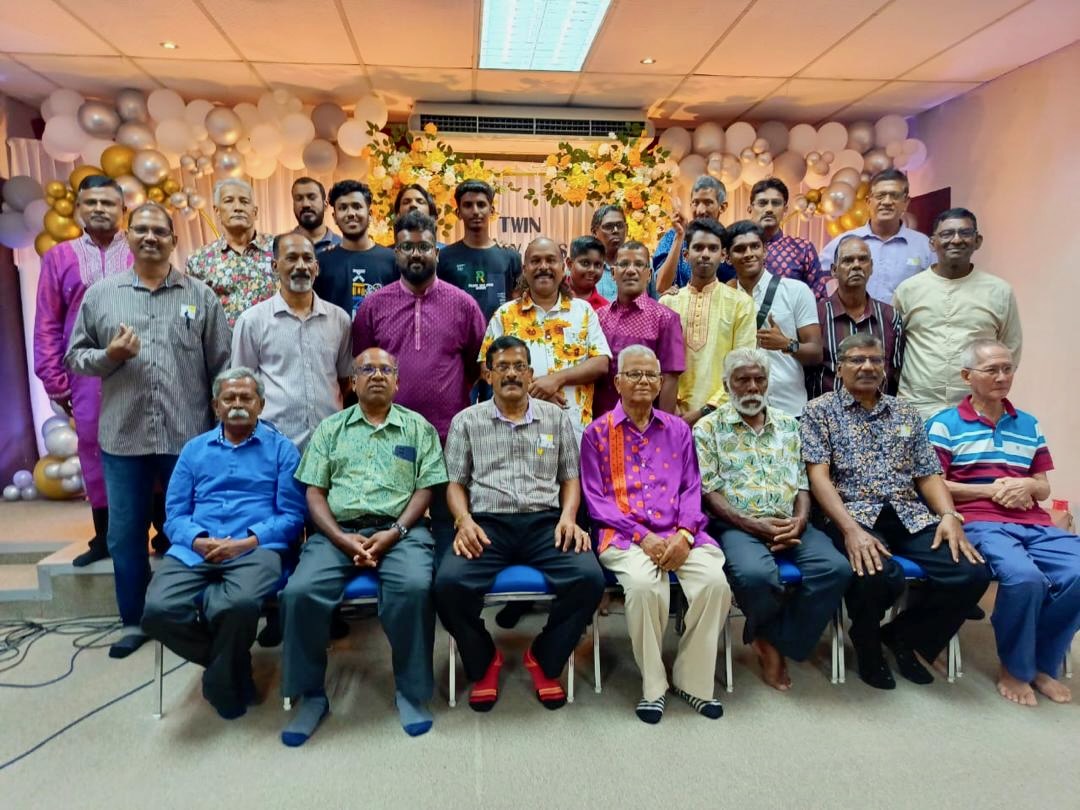 A group of believers at the celebration of the Twin Manifestations in 2023. Seated L-R: T. P. Letchumanan, Gunasegaran, Muniandy Raju, Suppan, Maniam, B. Suppiah and Frankie.
A group of believers at the celebration of the Twin Manifestations in 2023. Seated L-R: T. P. Letchumanan, Gunasegaran, Muniandy Raju, Suppan, Maniam, B. Suppiah and Frankie.
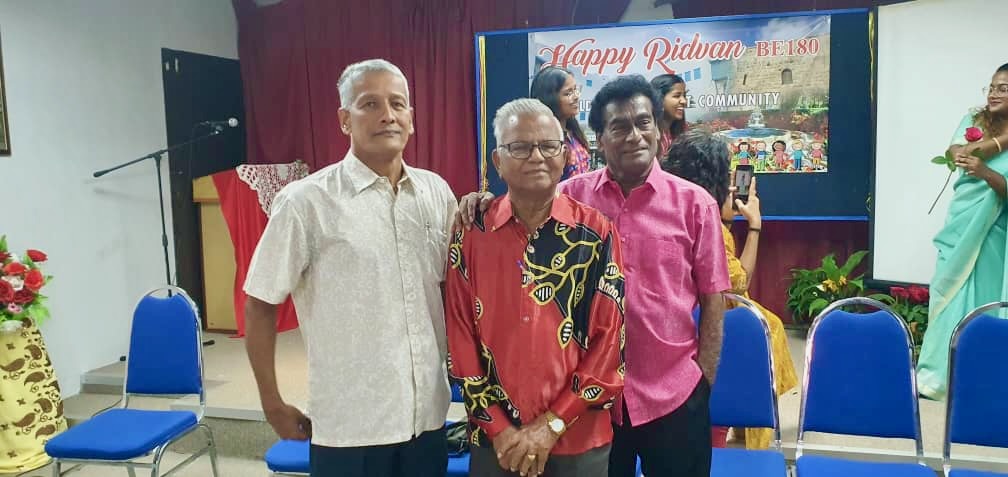 The last celebrations that Suppan attended-in 2024. Suppan is flanked by S. Sanggaran at left and K. Tharmalingam at right.
The last celebrations that Suppan attended-in 2024. Suppan is flanked by S. Sanggaran at left and K. Tharmalingam at right.
HIS LAST DAYS
There were two hobbies that Suppan carried throughout his life- wide reading, farming and gardening. He continued gardening in his backyard with a great passion. He kept communicating with his friends within and without Malaysia through WhatsApp. Though moving around with aid of a walking stick, he did not fail to attend all Bahá’í functions in his community. As Suppan advanced in age, the community noticed a visible inner spiritual calm in him.
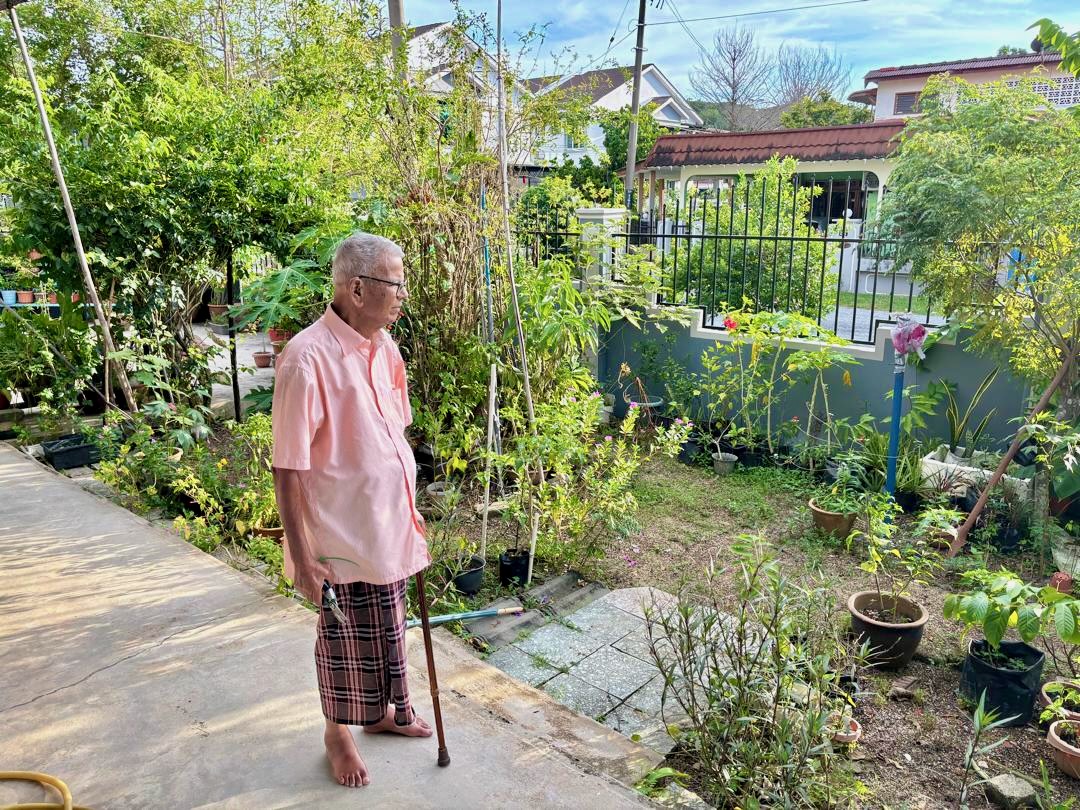 Holding pruning scissors, Suppan gazes at his garden with great passion.
Holding pruning scissors, Suppan gazes at his garden with great passion.
In all circumstances, the Faith was uppermost in his mind with Bahá’u’lláh at the center of his life. Even close to his final days there was always something that he wanted to do for the Faith he loved. Though he was physically weak, he maintained a very sharp mind. Last year, at the age of 84 he proof-read and gave editorial assistance to a book in the Tamil language on the compilation of stories on Mullá Husayn, the first believer in the Báb authored by Mrs. Selvi Vasu of Changloon community. She was amazed at the sharpness with which he performed the task. As his final days drew nearer he was talking to believers, including my own self that he would like to finance publication of a book on the services rendered by some unsung Bahá’í heroes from the Tamil speaking community. His last talk to the community was at the Feast held on 31 July 2024, which he delivered on the request of those gathered. Whenever Suppan was asked to give a talk on a specific topic he was always well prepared. This time he was called up at the last moment, and yet he gave an emotionally charged speech where he advised on what the individuals and community have to do for the onward march of the Faith. He urged all to be punctual for meetings, earn well and contribute to the Bahá’í funds and have some savings for the rainy days. When Suppan addressed the gathering he saw the third and even fourth generation believers in the gathering. He always related success stories from the 1960s when intending to inspire the community. He had witnessed many historical events during his early days which were unknown to the new generations.
 Velayutham Gopal, a pioneer from Sungai Petani to Cambodia, made it a point to visit Suppan every time he returned home for a break. This was his last visit in September 2023.
Velayutham Gopal, a pioneer from Sungai Petani to Cambodia, made it a point to visit Suppan every time he returned home for a break. This was his last visit in September 2023.
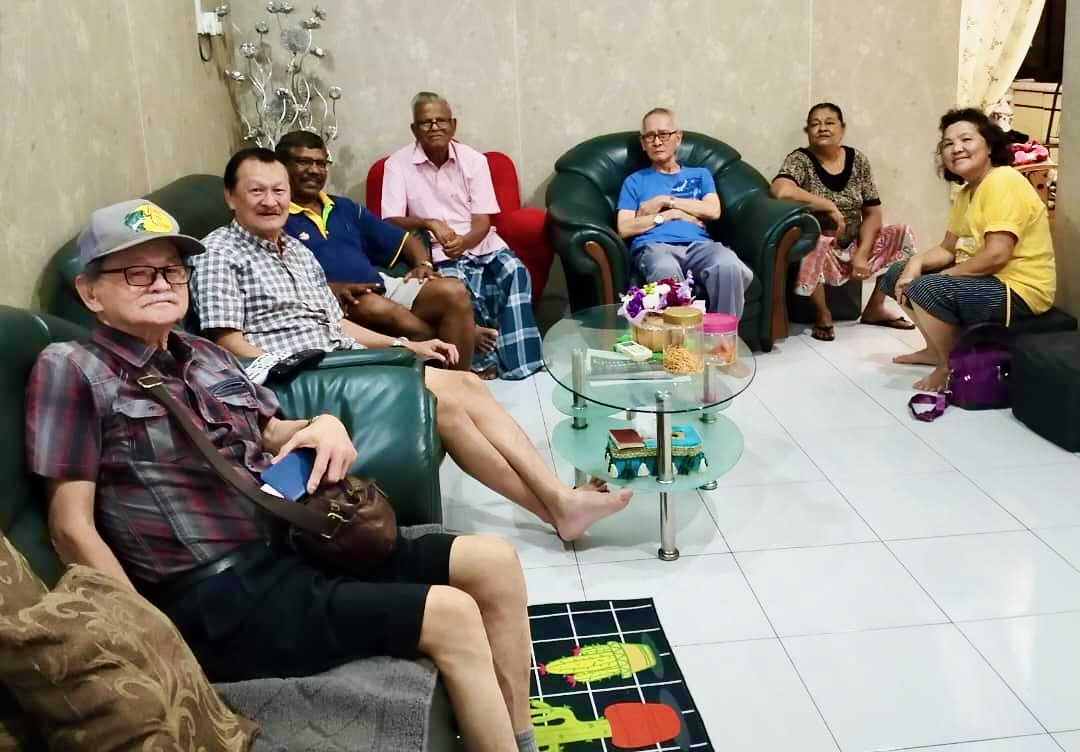 In October 2023, Teh Teik Meng and Teh Teik Hoe from Shah Alam visited Suppan at his residence. Seated L-R: Teh Teik Meng, Teh Teik Hoe, B. Suppiah, Suppan, Frankie, Mrs. Krishnammah Suppan and Mrs. Siew Suan. Teh Teik Hoe originally from Alor Setar is a close friend of Suppan for more than 50 years.
In October 2023, Teh Teik Meng and Teh Teik Hoe from Shah Alam visited Suppan at his residence. Seated L-R: Teh Teik Meng, Teh Teik Hoe, B. Suppiah, Suppan, Frankie, Mrs. Krishnammah Suppan and Mrs. Siew Suan. Teh Teik Hoe originally from Alor Setar is a close friend of Suppan for more than 50 years.
Most recently Suppan donated a significant amount for the future purchase of a larger Bahá’í Centre in Sungai Petani. In 2016, he had completed writing the history of the Faith in Sungai Petani which was not published yet. While on the death bed, he spoke to Mr. Sangaran Chinnian, Chairman of the Local Spiritual Assembly to add one final chapter on the active involvement of the Bahá’ís in a tree planting activity at the premises of the Old Folks Home in Bedong town. Among his family members he had insisted prevalence of unity forever. Those were his last wishes.
News spread that Suppan was declining in health. Believers from all over the country started visiting Suppan at his home. He was feeble and weak but was mentally keen and alert. As his days were drawing closer, Suppan wished to visit some of the places he was associated with as well as the remaining few old friends. Although he used a walking stick towards the tail end of his days, he never missed attending Bahá’í meetings at the Bahá’í Centre.
R. Kanthakumar, a dear family friend from Ampang Jaya visiting Suppan in June 2024.
He passed away on 6 September 2024 after a short period of illness. The rock of the family and the community was no more. At the time of Suppan’s passing, he happened to be the only one to have remained a steadfast believer among those who had accepted the Faith along with him in Sungei Petani. Suppan was also the oldest Bahá’í in the Sungei Petani community. He was also widely known among the old believers in the country, especially the Tamil speaking believers among whom he moved like a colossal figure. Some time ago when the believers of Penang came forward to purchase land in Sungai Petani to be used as Bahá’í Cemetery, and Suppan gave his fullest support. He himself bought five burial plots, one for himself and the remaining for other family members. He even had informed that one plot was to be reserved for his brother Manisegaran in the USA, in the event he happened to pass away on his visit to Malaysia. Such was his magnanimous heart. Suppan was given the most befitting funeral service and buried at the Nirvana Memorial Park in Sungai Petani. The funeral service and burial were of a kind that had never been witnessed in the history of the Faith in Central Kedah. Both family members and members of the Bahá’í community joined hands in giving the most befitting and respectful send off. It was simply a case of a new generation of believers paying their last respect for one who had been their guide and example.
Knowing his days were close, Suppan who wanted to be aligned with the teachings wrote a Bahá’í Will. It was read by Mr. Sangaran Chinnian, Chairman of the Local Spiritual Assembly, as per the wishes of Suppan, in the presence of the family members a few days after his passing. The content of the will moved all to tears, as it reflected how magnanimous a Bahá’í he was. The will contained wordings in the true Bahá’í spirit. Sangaran himself sobbed when reading out one particular section of the will. Sangaran would later comment, “It would not be easy for any believer to have written the will the way Suppan did”.
HIS VIRTUES
Much more could be written on his resolute services for the Cause during his sixty years of Bahá’í life. His was indeed a lifetime of distinguished service for the Cause he loved most. But equally outstanding in Suppan were his great virtues. He had great and praiseworthy virtues that can never be easily rivalled by others. Among others, he had two very outstanding qualities in him. He had a huge heart to forgive even those who had hurt him to the maximum. He had a great heart to forgive even those who had hurt or disappointed him to the core of his heart. Whenever deeply hurt by others, he would resort to prayers. He was extremely patient with everyone. From the very early days, sacrifice seems to be what his life has been. Saddled with financial constraints in his early days Suppan was involved in various part time jobs, to support his family and the Faith he loved most. As he would recount later, he had listed many small-time business ventures to keep his family afloat and to attend to the needs of the Faith.
Suppan was able to climb out of his financial strains close to his retirement in 1989 when he joined the Great Eastern Insurance company as an agent. He also roped in several other believers, including Mr. Rama Naidu who was residing in Bagan Serai at this time. It was from then onwards that Suppan was able to travel to several countries for Bahá’í functions or visiting family members.
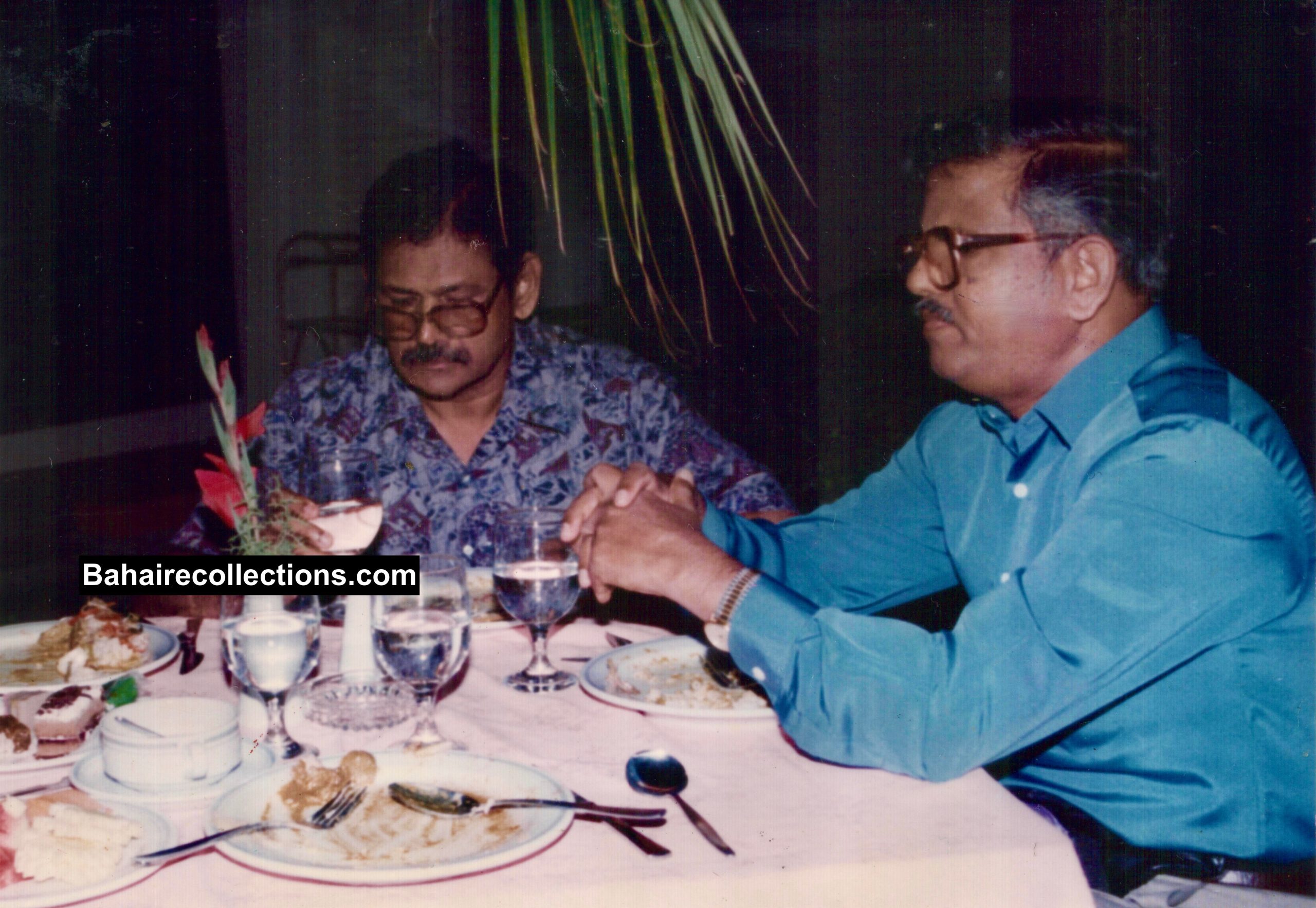 Rama Naidu and Suppan at the Great Eastern insurance meeting and dinner in Bali, Indonesia in 1993.
Rama Naidu and Suppan at the Great Eastern insurance meeting and dinner in Bali, Indonesia in 1993.
In early 1970s, Suppan bought a land for small scale commercial farming in the outskirts of Sungei Lalang town. He successfully harvested some commercial crops. But he had to move into Sungei Petani in the 1980s and therefore could not manage the farming owing to the long distance. He therefore sub-divided the land into plots and sold them away, donating one plot to the National Spiritual Assembly of Malaysia. His thoughts were always centred on the needs of the Faith.
Even in those difficult days his house was always open to visitors, providing the best hospitality possible within his means. Whenever Suppan went to the town, he would invariably return late, as he had a huge pool of people to talk converse with, having settled in this town since 1965. They all knew Suppan as a Bahá’í and his itself became a household for the Faith in this town. There was no person who entered his house and left without partaking of meals, some of which were prepared by Suppan who was himself a great cook. Anyone would drop in any moment, and so his standard instruction to his wife was to always cook extra. His warm hospitality became a household name in the community. Whenever he wanted to visit a family, he would make sure he had gifts for all the children. Yet one more greatness for which Suppan earned the love and admiration of non- believers was the sincere and genuine love and concern he showed all, listening to their woes and solving their problems, or advising them as to how they could come out of their distressful situations. That Suppan was able to show the same genuine and sincere love and feelings for both his family members and believers seems to be the most outstanding virtue in him.
He was a highly dedicated teacher who believed in the Bahá’í teaching of carrying out work as a form of worship. When serving the Cause or the wider community Suppan always believed in excellence. On 29 January 2015, His Royal Highness the Sultan of Kedah honoured Suppan with the Bintang Kebaktian Masyarakat (BKM) award, otherwise the Public Service Star award, which is conferred upon those who had performed outstanding service to the public. Many of his students who made big in their careers did not fail to visit him at his home. The old students of the Arumugam Pillai Estate Tamil School honoured their former teachers, and Suppan was one of them. Feelings of gratitude welled up within those students.
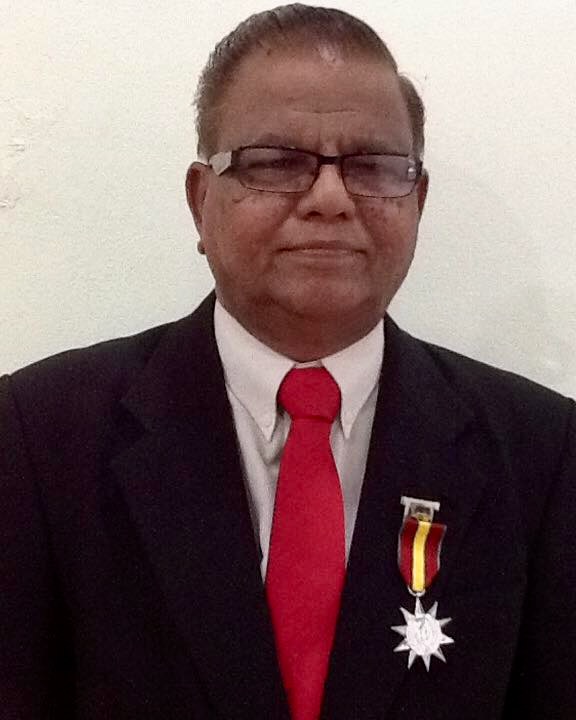
Suppan decorated with the Bintang Kebaktian Masyarakat (BKM) Award
He had struggled all his life to establish the Faith in Central Kedah. When Suppan went for the Second Bahá’í World Congress in New York in November 1992, he was moved to tears witnessing the triumph of the Faith in action. When meeting Mr. Kanniyah Adaikkalam, who had settled in Los Angeles after returning from pioneering in Africa, Suppan commented with great joy, “All the believers who had served the Faith in Sungei Petani the early days are eminently placed in society and are doing well in their families and the Faith. The Faith is solidly established”. He did not stop there. “I am smiling at all those who laughed at us in those days”, he quipped.
Having tasted financial hardships, Suppan urged family members and believers to be financially strong. Under all situations his contribution to the Bahá’í funds or helping the needy did not fade. As a towering figure among the relatives, many of them sought his shelter and received all kinds of assistance from time to time. This included believers too. He had quietly taken care of many unfortunate people in the community, without the knowledge of others. To cite a case, there was an old man in the old folk’s home in Bedong. He had known of the heart of Suppan that was bigger than life size. When that person died Suppan gave him a burial according to Hindu rites and took care of all the burial expenses.
When his mother passed away in 1961, he took his sister Janaki and brother Manisegaran under his care and nurtured them in the Faith. He sent Manisegaran to English Primary School but insisted on taking up Tamil as a subject through home tuition. The reluctant Manisegaran went for the tuition and took the Tamil language as an optional subject at University Malaya. Manisegaran used his Tamil expertise for the Faith in later years, with a note of gratitude to his far-sighted brother. Like Suppan, his sister Janaki and brother Manisegaran too emerged popular writers and won literary awards from reputable institutions. Suppan and his two siblings were able to create inroads in taking the Faith to the Tamil speaking population with their calibre of the Tamil language.
When Suppan had five children through his first marriage he played his role as a dutiful father by sending all of them for children’s classes. As his children grew into adulthood he gave them total freedom to choose their lives, reminding that ultimately they are answerable to Bahá’u’lláh in whatever they did. At the time of his passing Suppan had eight children and thirty-two grandchildren. He was always a loving husband, caring father and a lovable grandfather. He was deeply gratified with his second wife, Krishnammah, who was his source of comfort and strength standing by him through thick and thin in all his endeavors. Within the family circle he was seen as a magnetic force, and one who visibly radiated boundless love upon all.
As a majestic personality with a heavenly smile and radiant face, people who had met him for the first time would invariably end up as life-long friends, as his company would simply enhance one’s spirit. He was so witty, jovial and bringing so much joy that believers and non-believers of all ages and from all walks of life to flock to him for advice and guidance on a wide range of subjects. Those who met him in his house and entered into conversation with him would not return home close to midnight, or even past midnight. As a man of vast and wide experience in life, he always had some invaluable advice for those who specifically came for his advice. He always stood as a bulwark of inspiration and guidance to the community, who always spoke with a smile on his face. A down-to-earth personality, Suppan was always soft- spoken, but firm whenever the need arose. As a man of utter humility, he never sought name, fame, or prominence. He did not believe in backbiting or speaking ill of others. He saw only the good sides in every human being he came across. Whenever he was hurt or insulted, he would resort to prayers and leave them to the care of Bahá’u’lláh, Whom he always considered was the best of all judges. In his 60 years of Bahá’í life, Suppan has earned the love and admiration of countless friends.
As any other ordinary human being, Suppan too faced several challenges in his life but was able to come out from all odds and went on in life, placing his full trust in his Creator. The life of Suppan has been well spent, basking throughout his earthly days under the shelter of the Blessed Beauty. He loved and served the Faith to the best of his ability, striving to dedicate the finest and most productive years of his life to the Cause of God.
Suppan was a great motivator. He always spoke with optimism and encouraged all to excel in their lives. The youth, and even the adults used to approach him for advice on several important matters. Believers and non-believers who had moved with Suppan never failed to mention his sense of humour. He always combined his witty jokes with wisdom and never at the expense of any individuals. There was one drug addict who found his life hopeless. Suppan sweet talked to him and helped to open a bank account for him. That youth turned a new leaf and is doing well in his life.
Suppan was thrown into a challenge in the very first two years of accepting the Faith. As there was so much opposition from the community and being the sole worker for the Cause in those days, he knew that he was being watched carefully from various quarters. He was forced to mirror forth a pure Bahá’í life to the best of his ability, keeping in mind that in doing so he had to maintain the prestige and superiority of the Cause. That naturally and certainly involved so much painful sacrifice on his part. But it was rewarding indeed. He became highly respected in the Tamil-speaking community. Even the avowed enemies of the Faith developed a special fondness for Suppan, on account of his fine virtues- virtues that stemmed from the Teachings of Bahá’u’lláh. There was no reported case of people finding faults at Suppan. He was known for his high integrity. When there was a kind of misappropriation of finance in the Kedah Provision Store, which was a grocery shop run as a cooperative, the members appointed Suppan to oversee its proper functioning. Suppan was invited for many weddings and family functions. Suppan never missed funerals in the Sungai Petani community. Although he was deeply steeped in service for the Cause, he had the uncanny ability in creating a dexterous balance in consorting with the Tamil speaking community only to win their respect and even reverence. The members of the wider world could have rejected the Faith, but they kept Suppan close to their hearts.
It would become anyone’s guess that Suppan has been created by the wondrous hands of Bahá’u’lláh for specific roles. It is indeed difficult to put Suppan in one particular box, given the various fields and capacities in which he has served. He had lived a long life to happily see the development of the Faith unfolding right in front of his eyes from 1965 to the day his precious soul winged its flight to the Realms on High. Suppan was moved to witness the second and third generation of believers serving the Cause with such a determination and dedication. He was proud that a strong, stable and mature Local Spiritual Assembly functioning in this community. He was most satisfied that the community had risen to CLUSTER A level at the time of his passing. The Local Spiritual Assembly and the members of the community too held him in high esteem and honoured him.
Suppan has certainly left some indelible traces in his own way of loving and serving the Faith, which is already acknowledged by the old time believers who had known and moved with him intimately. Suppan has set good examples in many ways which are sure to be emulated by generations yet to be born. In his passing the Malaysian Bahá’í Community has lost a distinguished and truly dedicated legendary believer whose services would adorn his name in the annals of the Faith. Reading Suppan’s life, one would readily agree that certainly incalculable blessings await him in the realms above for the services he had carried out on this earthly plane with all sincerity, devotion and commitment.
A. Manisegaran
31 October 2024
Copyright©bahairecollections.com
34 thoughts on “REMEMBERING P. U. SUPPAN”
Thank you Mr. Mani for writing about your brother Mr. Suppan.
I was so emotional while reading his services and legacy. Only angels can carry out like this kind of endless service with selfless love and drown in the love of Baha’u’llah. He surely deserves a lifetime achievement award. But the best award does not come from us. It comes from our Creator. I have no doubt that Mr. Suppan has won the good pleasure of his Lord in the next world.
M. Kalai Selvi
Tanah Merah
Kelantan
Malaysia
Dear Mani,
I read the story about Suppan. It is only after reading this story I came to understand that Suppan is your brother and a spiritual father as well since he is the one who gave you the Faith and nurtured you in the Faith.
I remember his calm, gentle and friendly face from the many Baha’i gatherings in Malaysia. I was moved to learn from your story that he has booked you a resting place next to where he is buried now.
Reading of his teaching activities, it is very humbling. He was a gigantic figure in the Faith. God bless his illustrious soul eternally.
Only when you record these things for posterity can we get a glimpse of the early workers for the Cause. I wish I had known him better.
I think in future the northern states of Malaysia will have their own stellar spot in Baha’i history.
Thank you
Usha Cheryan
Sydney
Australia
Dear Mr. Manisegaran,
I have known Uncle P. U. Suppan since my youth, during my time living at Ghim Khoom Estate in the early 1980s, when he was actively engaged in estate teaching campaigns. However, I only got to know him more closely when I moved to Sungai Petani in 1985 to pursue my secondary studies at Dato’ Bijaya Setia School. During my early days there, I had no idea about Uncle Suppan’s spiritual background in the Bahá’í Faith. Yet, I soon realized that there was hardly any Bahá’í activity or event in Sungai Petani that did not involve his presence. His dedication, determination, and love for the Blessed Beauty were evident in everything he did.
I vividly recall those estate teaching trips during the “1000 Projects and 5000 Projects” when Uncle Suppan would drive us in his car daily. To accommodate the large number of believers participating in these spiritual activities, he often had to make several trips a day. Uncle Suppan holds a special place in my heart for many reasons. He was always soft-spoken, a man of great humility, knowledgeable, and always smartly dressed and composed. His readiness and sincere involvement in all Bahá’í activities were truly exemplary. His proficiency in the Tamil language was superb, and his spiritual insights and deep love for the Faith shone through in everything he did without expecting any attention or reward!
Moreover, his problem-solving ability, witty humor, choice of words, readiness to assist others—whether spiritually, mentally, or physically—his foresight in accumulating wealth and contributing to the Bahá’í funds, his appreciation for others’ talents, and his meticulous bookkeeping standards were just some of the qualities that made him stand out. As new members of the Bahá’í community of Kuala Muda, and later of Sungai Petani, my siblings and I were spiritually nurtured and well-guided by elders like Uncle Suppan. He treated us like his own children, fostering a sense of unity and belonging as we mingled freely with his children. He frequently visited us, shared insights about the Faith, and inquired about our well-being and studies. As a caring member of the Local Spiritual Assembly, he was both a loving teacher and a father figure to all.
I consider Uncle Suppan one of my spiritual motivators and an insurance mentor among many things. He had a special fondness for me, and I am forever indebted to him for his kindness and guidance. He helped me become an insurance agent with Great Eastern Life Assurance Co. Ltd. in March 1994, often driving me to insurance meetings in Butterworth every other week. He consistently encouraged my growth and took great satisfaction in seeing me handle clients independently. While driving, he would have me listen to motivational talks and enjoy discussing the lyrics of Tamil songs. One of Uncle Suppan’s greatest qualities was his calm composure—I never saw him get angry or agitated! He was truly supportive of my pioneering journey to the Kingdom of Cambodia in September 1994. He assured me not to worry about my insurance clients, promising to provide them with the necessary support on my behalf. Each time I visited Sungai Petani, I made sure to pay him a visit, sharing my pioneering stories and experiences. As always, he had many questions and paid close attention to details, often inquiring about my family and siblings too. I feel privileged that Uncle Suppan solemnized my wedding in January 1995 as Assistant Registrar of Bahá’í marriages. During our last family visit, he gifted us a young papaya tree to plant at home and shared tips on nurturing it.
My appreciation and respect for him grew even more after reading your pivotal and momentous work, Jewel Among Nations – An Account of the Early Days of the Bahá’í Faith in West Malaysia (2003). I never fully realized how much Uncle Suppan and the early Bahá’ís endured in terms of struggles, crises, and pain. Your remarkable penmanship moved me to tears. My perception of those early Bahá’ís changed profoundly, and my respect for them increased immensely. I felt privileged to share with the friends some of the unique contributions and spiritual legacy of stalwarts such as Uncle Suppan and others during my visit to Sungai Petani. Uncle Suppan practically made his home a center for all Bahá’í meetings—the base for Central Kedah since 1965—and wherever he moved, his home served as a Bahá’í Centre.
In his six decades of Bahá’í life, Uncle Suppan genuinely earned the love and admiration of countless friends, both within and outside the community. Not only has he left behind indelible traces of his unique way of loving and serving the Faith, but he has also set great examples in many ways that are sure to be emulated by generations yet unborn. “… O my God, Thy trust hath been returned unto Thee. It behooveth Thy grace and Thy bounty that have compassed Thy dominions on earth and in heaven, to vouchsafe unto Thy newly welcomed one Thy gifts and Thy bestowals, and the fruits of the tree of Thy grace.”
With loving Bahá’í greetings,
Vela Gopal
Phnom Penh
Cambodia
I have rarely seen a man with such qualities that decorated the dear brother Supan’s wisdom, patience, exemplary devotion to service to everyone that sought his help that he rendered with a radiant heart. Suppan’s sense of humility and sweet smile and profound love touched the hearts of those whom he interacted with.
I had the bounty of knowing him since 2017 whenever I visited Sungai Patani and Alor Setar when we did home visits together, prayed and discussed the ways and means of teaching priorities. May his radiant soul be immersed in the sea of light of the Almighty God. He is truly missed.
Dr. Firaydun Mithaq
Chiang Mai
Thailand
I did not know much about Mr. Suppan, but going through this article l am certain that Mr. Suppan’s unwavering dedication to the cause of Baha’u’llah is truly inspiring. His lifelong service has made a profound impact, and his contributions will resonate for generations to come. He will not be forgotten.
Thank you Manisegaran for writing about him.
G.K. Balan
Kuala Lumpur
Malaysia
Mr. Suppan was a very humble person. He dedicated his time carrying the Healing message of Bahaullah to many places throughout his life. We Bahais living in the Kilang Lama estate near Sungei Petani joined hands with him on many of such trips. The days that we spent our time with him are remarkable and well remembered.
Narayanasamy
Seremban
Malaysia
Dear Manisegaran,
Reading your article on Mr. Suppan was breathtaking. I had known him since the time I accepted the Faith in Alor Setar. Through him I came to know all his family members as well.
Mr. Suppan certainly was thankful to Bahá’u’lláh Who had enabled him to recognize His Cause. Mr. Suppan and put to action, without delay, in sharing the message of his newfound Faith. He joined hands with other early believers of his time from other parts of Kedah State and crossing over to the other states as well. His efforts were certainly herculean. It is rare to encounter his calibre today.
Of his services to the Cause, the following wors of the Blessed Beauty comes to my mind:
“They are, in truth, cup bearers of the life-giving water of knowledge and guides unto the ideal way. They direct the peoples of the world to the straight path and acquaint them with that which is conducive to human upliftment and exaltation. The straight path is the one which guideth man to the dayspring of perception and to the dawning-place of true understanding and leadeth him to that which will redound to glory, honour and greatness.” Bahá’u’lláh : Tablets of Bahá’u’lláh revealed after the Kitáb-i-Aqdas
Kamachee Martel
Lesotho
Africa
Dear Manisegaran,
The story on Mr. Suppan was indeed a great article portraying the great services of such a remarkable believer. It was great seeing you in your youth as well, Manisegaran.
So, Mr. Suppan is your brother who has served the Cause so well. He gave you the Faith and nurtured you into maturity. I hope you too would follow his fine examples.
Lee Lewis
Hawaii
USA
After reading the story of Mr. Suppan, I can say that he was a dedicated and dynamic Baha’i who through his activities did so much for the Faith.
Mr. Suppan has set great examples from the time he accepted the Faith in 1964. The path that he undertook for the Cause is so long, sometimes full of thorns. Yet he was able to overcome all odds with the immense love he had for Baha’u’llah and for His glorious Cause. He has clearly understood the Faith and its spirit very well. I was touched by the statement he made to Mr. Kannaiyah Adaikkalam on the way to the Second Baha’i World Congress: “All the believers who had served the Faith in Sungei Petani the early days are eminently placed in society and are doing well in their families and the Faith. The Faith is solidly established. I am smiling at all those who laughed at us in those days”.
His humbleness and kind behavior as portrayed in the story will be remembered.
Natasha Chandrasekaran
Tanzania
Africa
Dear Manisegaran,
A glimpse of Mr. Suppan’s life is enough to evoke the amazing power of The Holy Spirit in turning copper to gold.
How individuals whose pure hearts are seeking and finally embracing the Truth. Yet like all pristine souls, Mr. Suppan was slapped with many challenges. Makes me perplexed mankind can be pure, and on the other hand some are so mean with unbecoming behaviors. Therein emerged heroes -many unsung ones who brought redeeming hope in humanity.
Suppan was a quiet and silent giant, but made a dramatic history.
God bless his soul.
Ong Eng Eng
Klang
Malaysia
I remember your Suppan when I was in the Alor Setar community. Whenever we talked about the early history of the Faith in Kedah, he would be remembered as one of the early stalwarts who dedicated his life to the service of Baha’u’llah soon after accepting the Faith till his last breath. Suppan was a very close friend of my late brother Teh Teik Cheow.
I remembered when we from Alor Setar whenever we go down for teaching/visiting the estates in Central and South Kedah, we would frequently stopped by his houses in Sungei Petani, and later Sungei Lalang. There were very few Chinese Bahais in Sungei Patani and if I remembered correctly Miss Kwi Chin ( Mr. Dennis Chee) and family were staying in Sungei Lallang and would have come under the nurturing wings of Suppan and family.
For many of us in Alor Star, we fondly called him “Chuppan” as he was always cheerful, smiling, humble and gentle but a strong and dedicated believer of the Blessed Beauty.
May his soul now find external rest in the Abha Kingdom.
Teh Teik Hoe
Shah Alam
Selangor
Malaysia
Suppan’s strict demeanour is actually a façade of his gentleness and love for people. I met dear brother Suppan when as youths we visited the Arumugam Pillai Estate in Sungei Petani where he was the teacher at the Tamil Primary School. Suppan was a great teacher and encouraged the parents to send their children to school. Tamil schoolteachers were very respected. I also remember passing some nights at his home just after he got married in 1965. His home was like mine as well.
Two things that strike me about Suppan were his steadfastness and love for the Tamil culture.
He held the fort up north, consistently and steadfastly teaching and proclaiming the Faith despite local opposition. It was said for instance that mischief makers poured sand in his motorbike petrol tank. In those days local assemblies were not as matured nor deepened. The Institutions depended on individuals like Suppan to communicate, motivate and rally the friends at grassroot level. In that role he was a giant and remained firm and strong till the end of his life. So when you remember how he tried in so many ways to attract people to the Faith and used his own hard earned funds to open up centres and provide refreshments and meals to inquirers and local believers, one can definitely emulate such a exemplary behaviour. Reminds me of this verse from Abdul Baha:
“Today is the day for steadfastness and constancy. Blessed are they that stand firm and immovable as the rock and brave the storm and stress of this tempestuous hour. They, verily, shall be the recipients of God’s grace; they, verily, shall receive His divine assistance, and shall be truly victorious. They shall shine amidst mankind with a radiance which the dwellers of the Pavilion of Glory laud and magnify.” Selections from the Writings of ‘Abdu’l-Bahá, pp. 17-18
The second thing about Suppan was his love for the Tamil culture. It was people like him and Uncle Nagaratnam who not only taught the Faith of Baha’u’llah, but they also fostered the love of the Tamil literature and culture in a humble and respectful way. By mixing with Uncle Naga and Suppan and V.S. Maniam, as a youth I too became aware of such names like Thiruvalluvar, Rabrindranath Tagore, and Swami Vivekananda. They did this unlike other who had political motives and egoistic pride (because Tamil culture and heritage were often used as political tools) and shared the healing message of the Baha’i Teachings in their mother tongue. I believe this selfless service contributed in no small measure to the receptivity of the Tamil speaking believers in West Malaysia making them one of the largest components of the Baha’i population in Malaysia.
Indeed, Suppan was one of the true sons of Malaysia and a remarkable co-worker in the service of this Blessed Cause. May the Blessed Beauty bless and nurture him in His Divine love throughout all the eternal worlds of God.
Yin Hong Shuen
Singapore
Dear Mani
I read the story on Mr. Suppan. It is such a long article covering so many areas of his service for the Cause of Bahaullah. He has indeed come a long way since accepting the Faith in 1964, facing so many challenges, trials, tests and struggles. At the end he was still firm in the Faith and lived an exemplary life. I can fully understand how difficult it could have been for a Tamil school teacher to go against the tide in the Indian community to remain firm. You have given very good example of other Tamil school teachers including Mr. Karuppiah of Muar, whose own struggles I have personally known. Admittedly very few Tamil school teachers were firm till the end, and Suppan was one of those rare gems.
I have met Suppan at a few National Conventions. He was very unassuming, quiet and observing the entire convention proceedings with keen attention. He was soft spoken. I have exchanged greetings with him. But I never knew that this very quiet worker had silently done so much for the Cause in the northern part of the country. What he has achieved for the Cause is tremendous. I read all the great qualities of Suppan. It appears to me that his method of teaching the Faith was by living the life and not through mere words of the mouth. The current generation will have so much to learn from the life of Suppan and the early believers of the early days. They all belong to an era never to be repeated!
C. Kanagaratnam
Arizona
USA
Beloved Baha’i brother,
When reading the story of Mr. Suppan, I learnt so many things, especially, his virtues, his sacrifices and his exemplary life. It is interesting to know how he taught and spread the Cause of Baha’u’llah under so many difficult situations. The most important thing is that he accepted the Faith, faced the opposition and still remained firm till the end of his life.
Mr. Suppan accepted the Faith in 1964, when I was 10 years old. All his dedicated, devoted, sincere and sacrificial services are being remembered by us. He will also be remembered in the next world for making mention of Baha’u’llah’s name while on this earth. May his blessed and radiant soul rest in peace and tranquility in the Abha Kingdom and in all the realms of God.
Thank you once again for this great and wonderful story.
Jaya Raju Thota
Greater Visakhapatnam
Andhra Pradesh
INDIA
Dear Mani,
This is really a moving account of the life of a sincere, devoted, and guided soul of the Blessed Beauty who became attracted to the Faith at a time when the Faith was still infant in this country. With the limited availability of printed material, especially in the Tamil language, I believe he was most certainly chosen by the Blessed Beauty to spread the Faith to more than 50 estates in the state of Kedah. Mr. Suppan has indeed remained firm as a mountain throughout his Baha’i life of over 60 years. He has taught the Faith both in words and by living the life, as I gather from this story. I believe you were privileged to have a dear brother like him.
Thank you for this wonderful recollection.
Arulnathan
Kuala Lumpur
Malaysia
Dear Mani,
I am really glad to have read your loving account of the life of your brother Suppan which evinced steadfast and consistent service to the Faith. What interests even more is getting a glimpse of the little part of your early life.
Suppan’s life as a Baha’i in the 60s and 70s in rural setting surrounded by rubber estates was no stranger to me. The challenges and opposition he had confronted were familiar to me too. In a way they have evoked in me certain fond memories. I had accepted the Faith in 1967 in Bagan Serai, a small town in the State of Perak. Some of my weekend activities were visiting nearby rubber estates to meet with Baha’is and deliver newsletters with Mr. Rajagopal a teacher at my school on his trusted motorbike. In 1968 Rajagopal and I visited Alor Setar and met Mr. Nagaratnam. Later we were told that we were the first guests to sleep in the newly opened Baha’i Center of Alor Setar.
My family came to Johore in 1991 after staying in Sabah for over 8 years. We joined the Baha’i community of Johore Bahru Tengah, later renamed Skudai and finally Iskandar Puteri by the State Government. Over the years this community has gained from strength to strength, partly due to the many Baha’i friends coming over from Sungai Petani with their families. Most of these friends remained active and contributed greatly towards the growth of the Faith once they had settled down. In my mind they could be considered as “the descendants of Suppan” . They are all indeed champions of home front settlers. When we first arrived the community size was about 60 with children and presently it is over 300.
It is also interesting to note that of the many recollections I have read this is the only one which I can identify about 40 friends from the many photos it contains. I was fortunate to have moved with believers in the rural parts of Malaysia, especially the rubber plantations and can say that they were very sincere souls touched by the spirit of the teachings, more than the Teachings itself. The vast majority of the believers in the 1960s came from the Tamil speaking communities especially the estates. Today the estates are no more, and only their memory remains in history. It evokes such a profound feeling to look at the struggles, pain and the sacrifices of the believers of the early days, and Suppan was indeed one of those who served relentlessly despite the odds he faced wherever he lived. The good thing is his last days were well blessed- surrounded by good family members, and supported by the community and the Local Spiritual Assembly where he lived. No service for the Faith is wasted, however small they may be. Suppan’s is a life that was well spent, and well blessed, leaving so many lessons for the current generation to reflect upon.
Again, sweet memories thanks to you dear Mani.
Hua Keng Tong
Iskandar Puteri
Johore
Malaysia
Dear Manisegaran,
That was a beautiful account of dear Mr. Suppan. I believe it will be a record for posterity and for sure future generations of the Sungei Petani Baha’i Community will draw inspiration from beloved Suppan’s shining dedication. The challenging early years in sustaining the growth of the Faith in Sungei Petani and dear Suppan’s steadfastness and sacrifices in spite of those challenges and his complete reliance on Bahá’u’lláh with a radiance and inner joy is exemplary.
It was my good fortune that I had the bounty of seeing in person even as a youth and learning from this hero’s valiant deeds. His humility, witty humor, his ever-ready-to-serve attitude and his unshakable conviction in the truth of the Cause he had espoused had an indelible impression on me. His boldness in teaching the Faith to a cynical band of colleagues and contemporaries and winning their respect and admiration through his deeds and services is indeed remarkable.
May his soul rejoice in all the worlds of God.
R. Kanthakumar
Ampang Jaya
Selangor
Malaysia
Mr. Suppan left a profound impact on me as a Baha’i. I had known him for the past 40 years and was privileged to move closely with him for 35 years.
He was a very positive person whose talks were always very motivating for people of all ages. We all loved his company as he was jovial, and his jokes brought so much laughter to all. As an avid reader he always had something to share with whoever he met. He always had a business mind. He used to say that there are so many opportunities out there and each of us could take up some small scale business to keep our lives going during economic downturns. He himself had carried out some business.
He always admired and cherished the achievements of others. He was always the first to congratulate when someone was successful in any undertaking. I loved his non procrastination attitude and his punctuality. He was always well dressed suiting the nature of the functions he attended. He was independent throughout his life. Even at the end of his life he himself drove to the bank, attended functions like weddings and funerals.
From the time I had known Mr Suppan, I had observed that he was always intuned to the needs of the Faith and aligned himself with the messages from the higher institutions. Activities like devotional meetings at his home, attending cluster activities and going out for teaching activities were among this notable involvement When he loved someone, his love was always genuine and sincere. He was always concerned of the well-being of his fellow believers in the Baha’i community and other friends in the wider world.
To my knowledge Suppan had strived to live a true Baha’i life and he can be emulated for years to come.
Now that he is no more, I am able to reflect on the greatness of this great servant of Baha’u’llah. I truly mourn the unfathomable loss of Mr. Suppan who is more than an elder brother to me.
R. Gopal
Sungei Petani
Kedah
Malaysia
The story of Mr. Suppan is not only highly inspiring, but I can also see his joy in serving Bahá’u’lláh in many capacities and many ways, no matter what the challenges or obstacles he faced. He faced every difficulty with determination, always yearning to gain the love of Bahá’u’lláh. Under all circumstances he never giving up his faith. And that is the greatness of Suppan.
He set an example for we younger generation of Bahá’ís. He had clearly shown that with determination in one’s faith, anything is possible. He managed all his responsibilities, balancing his personal life and his service to Bahá’u’lláh in an incredible way. Throughout, the story is filled with deep emotions. The Bahá’í world needs more believers like him. He was a great father and a loving husband within the family, a centre of consolation for his relatives, a sincere friend in the Bahá’í community. To sum it up, he was a great Bahá’í by all accounts.
Joy Wahengbam
Kumbi Cluster
Manipur
India
I read the story of Mr. Suppan with the greatest interest. I had known him as a strong believer in Baha’u’llah. We the first batch of believer in the nearby Kilang Lama Estate always enjoyed and appreciated his regular visits to deepen and encourage us. Likewise, we too enjoyed visiting him at his home. But it was only after reading this story that l realized, how much he has done for the Faith in a very quiet and unpublished way. He was indeed a dedicated servant of Baha’u’llah. His contributions to some fifty or more estates around Kedah area was a remarkable service. These estates are no more in existence, and they are only in the memory of history. The current generation would not have heard of those estates. But they were the real teaching grounds in those days.
Manisegaran, you have certainly portrayed eloquently the great services your brother offered for the Faith. This story will be a real inspiration for all of us and for the generations to come. Now he is surely enjoying in the company of great holy souls in the Abha Kingdom for all the sacrifices and services rendered during the early days of the growth of the Faith.
Andy (Muniandy)
Perth
Australia
I have e known this great believer, fondly known as “Suppan Sir” since 1990. I became closer to him in 1993 when I pursued my course in the Teachers Training College in Sungai Petani, Kedah. As a trainee, I used to visit his home quite often for many reasons, chiefly good food. Whenever I entered his blessed home, he will call out for his wife and inform her of my presence, and she knew exactly what to do- prepare good food. He will then take me in his car to visit friends and teach the Baha’i Faith in the nearby estates and neighbourhoods. I have learned a great deal of effective teaching methods by watching him talking to whoever was crossing his path. All those friends that we have visited have developed very high respect for him. As for me I saw some kind of charm and radiance around him.
When I conveyed the message of his passing to my sister in law who is not a Baha’i, she started to tell a long story about how she was connected to the Baha’i teachings through her teacher, Mr. Suppan in the early days. The high respect of his students towards him and the high regards for the Faith that they developed by looking at his exemplary life never faded till now and will sustain forever. Hundreds of his students and people in the wider world had developed so much respect for the Faith through the life that Mr. Suppan had lived. This is only a small fraction of Mr. Suppan that I have known.
But after reading Mr. Manisegaran’s recollection of the services of Mr. Suppan, I realized that he was so profoundly humble in nature. Most of his dedicated services for Baha’u’llah for decades, as detailed out in the story were never shared before in gatherings or in any print media. Mr. Suppan himself had not shared with anyone. He is truly a living guide for people like me. May his soul be richly blessed and rewarded in the Abha Kingdom
Pandian Thangapandy
Ipoh
Malaysia
Uncle Suppan’s life embodied unwavering dedication and selfless service to the Bahá’í Faith and the broader community. Known affectionately as “Suppan Sir” by many, he was a respected teacher who shaped countless lives, including those of adults. When I was a youth in Sungei Petani I held him in high regard. This attests to the lasting impact he has had on the current and previous generations. I was fortunate to witness his resilience, wisdom, and generosity firsthand as I was a part of the Sungei Petani Bahá’í community from 1989 to 1996. Growing up in this vibrant environment, I was able to witness how Uncle Suppan was a role model and a source of guidance and strength for the younger generation. Youths would frequently visited his home, seeking his counsel on various matters, always finding in him a compassionate and wise mentor. He was a go to Uncle for many youngsters to find solace.
Uncle Suppan’s legacy endures as one of love, dedicated service, and steadfast servant of Baha’u’llah, leaving an indelible impact on his family, friends, and the community.
Zoran Arputhaselan
Johor Bahru
Malaysia
Brother Mani,
As one who is at his pioneering post like me, your biopic narration of uncle Suppan, is the epitome of a true servant of Baha’u’llah. The beloved Guardian has written about Corrine True having outstanding qualities of unswerving faith, boundless devotion, selfless sacrifice and instant obedience. It is on this same note that I see every aspect of Uncle Suppan’s life reflecting these outstanding qualities are. His life is surely one for me to emulate.
As a young Baha’i in the 1990s and early 2000, I have heard a lot of the spirit of the Tamil-speaking friends of the North. When sessions are divided by languages during conferences, I always found time to at least sit in for a while in the Tamil section. True enough, I was inspired witnessing the spirit generated by those friends. Uncle Suppan was a quiet person with a dignified look. It was always so nice to listen to him talking, especially the Tamil words he expressed so beautifully. He was knowledgeable and always adding in stories of Bahaullah in his exposition. The Tamil-speaking friends from other states always looked forward to be in his group, whether in the sessions, canteen or elsewhere.
I met Uncle Suppan at later years when I was serving in the Northern Bahai Council in 2010-2011. One of the challenges at that time was aligning to the needs of the Plan from the veterans. In our visits to his cluster, he was one of the earliest veterans who aligned to the paradigm shift required from the Baha’is. I remember his words, which helped our session to be in focus.
As a pioneer abroad now, reading Uncle Suppan’s experience, especially in teaching the Faith, facing adversities, staying focused, being kind are all so precious to me. When serving on the ground, it is a challenging time. Reading about these valiant souls is one of the ways to strengthen my inner self. Only someone with intense love in Bahaullah could tread Uncle Suppan’s journey of life. Every instance of his life is a learning lesson and an inspiration. Within him we could see a quiet, strictly professional person who was a spiritual giant.
Those heroes at that period of time are my constant inspiration.
Thank you very much for sharing about Uncle Suppan.
Kavidas Narayanan
Bandar Seri Begavan
Brunei
Dear Manisegaran,
Your inspiring story about Mr. Suppan touched my heart deeply. His relentless services clearly seem to have had a very significant impact on the growth and development of the Bahai Faith in Central Kedah in the early days.
Mr. Suppan’s unwacwering spirit for the love and dedication for the Faith has a strong message as how one simple and unassuming believer could create wonders for the Faith. Surely it was due to the breath of the Holy Spirit that worked in him. I remember these words of Abdul Baha in the Tablets of Divine Plan:
“How can I succeed unless Thou assist me with the breath of the Holy Spirit, help me to triumph by the hosts of Thy glorious kingdom, and shower upon me Thy confirmations, which alone can change a gnat into an eagle, a drop of water into rivers and seas, and an atom into lights and suns?”
I remember Mr. Suppan’s good friend, the late Mr. Rama Naidu in Ipoh who happened to tutor Ruhi Book 7 for a few of us. He too had those similar attributes as Mr. Suppan-being always joyful, humble, humorous and had a lot of stories to share.
Thank you for writing Mr. Suppan’s story to share with us.
Jane Lee Lai Wah
Ipoh
Malaysia
This is a well written account of Suppan whom I knew very well after moving from Alor Star into Sungei Petani in 1970. Suppan was a man of few words, but many deeds. He believed in fewness of words and abundance of needs. He was veery knowledgeable on the Faith and a sincere believer in every way. He was indeed a great and good Baha’i.
After settling in Sungei Petani, Krishnan, Suppan and I teamed up perfectly well to cover
and travel to all the estates among other areas in Selama, Gurun, Pandang Lembu and Kuala Muda. In fact we covered the whole of central and south Kedah and northern Perak especially during Ridvan elections to ensure no assembly lapsed. We used to leave our homes very early in the morning and return home late at night. Two days from 20 to 21 April we were not at home. God’s business came first-election and re-election of Assemblies first, after which we attended to our needs.
Suppan very much lives in history today.
Leong Foo Chong
Butterworth
Malaysia
I read in one sitting the story of Mr. Suppan and was very moved to see the extent of services he had carried out for the Cause. Many comments have been given on the services and legacies of Mr. Suppan. I would like to touch on how much personal care he would go whenever someone needed help.
Mr. Suppan was my class teacher in 1967at the Arumugam Pillai Estate Tamil Primary School. Mr. Suppan was a great Teacher.
He had a great passion to see the students progress in their studies. He lovingly had guided everyone irrespective of how good they were in the subjects he taught. Although he taught Science, Geography and Mathematics, I always eagerly awaited for his Tamil language class for he always narrated stories about the great kings of ancient Tamil Nadu. He further made it more interesting by quoting verses from famous Tamil poems and Thirukkural.
Later only after accepting the Faith I met him in 1975. I was greatly inspired by his constant reminder to study hard and to finish my degree after my Higher School Certificate exam. After passing my Higher School Certificate exam, I could not get admittance into any local university because I had not received my Malaysian citizenship yet. Mr.Suppan made an appointment to meet with the Madam Zainabthe Member of Parliament for Sungai Patani then and asked her to help. She willingly gave a letter to the National Registration Department regarding my matter. About three months’ time, I received my Malaysian citizenship. A new horizon opened to me. With this I went on to my degree course at the University Sains Malaysia from 1977 to 1981.I cannot thank him enough for such a care and concern he showed to me.
Such a wonderful and caring person, ever willing to give right guidance that one needs. Everyone who knows him will miss him greatly.
Thangavelu
Kota Kinabalu
Uncle Suppan held a very special place in my heart and in my family. His influence on my spiritual journey and material progress is truly remarkable. My association with Uncle Suppan spanning almost 50 years from the time of my childhood days was a beautiful example of the power of inter-generational relationships. Despite the age gap we maintained a close bond, and his guidance and mentorship had a profound impact on my life.
The teachings of the Baha’i Faith emphasize the importance of love, compassion, and service to others. Uncle Suppan’s life and legacy seem to embody these very teachings, and his great impact on those around him was a testament to his wonderful soul.
It was just one month before his passing that I visited him. That too was a poignant and meaningful experience for me. It was a lovely time when we recalled the memories of our time together.
The passing of Uncle Suppan is a tremendous loss to all those who had known him. I was there at his funeral and witnessed continuous flow of visitors from all over the country to pay their last respects to one whom they had come to love, respect and even revere so much.
I pray ardently for this noble and exemplary soul to continue its journey and be abundantly rewarded with all the bounties of the Almighty God.
The great example and legacy that he has left behind shall continue to inspire and guide me and many others in this generation and generations to come.
Elanchelvan Tarmalinggam
Iskandar Puteri
Johor
Malaysia
Reading the story of the late Mr. Suppan, I was deeply moved. That was an inspiring piece. His life story is a testament to unwavering dedication and immense courage. It is truly remarkable how, as a single individual, he shouldered the immense responsibilities of supporting his family and ensured their well-being through sheer hard work and perseverance. At the same time served the Cause most relentlessly.
His journey not only showcases his strength and selflessness but also serves as a powerful reminder of what one person could achieve through determination and love for the Faith. Stories like his encourage us to face our challenges with greater resilience and a sense of purpose. The struggles, challenges and tests he faced and came out victorious give us more strength to face anything in our own paths of service
It is truly remarkable to see the resilience, wisdom, and strength he has demonstrated in navigating throughout his life experiences. His ability to turn challenges into stepping stones is genuinely admirable. In fact, he is the greatest example for many to follow .
I always admired his courage, honesty and humility. Thank you
Gopal Kannan
Sungei Petani
Kedah
Malaysia
I had known Mr. Suppan as a kind and generous soul who had a penetrating impact on the lives of many who crossed his path.
He had only nice things to say about others. He always had some advice for the youngsters. One could go to his house any part of the day and even night and would always be welcomed with a broad smile.
He was a dedicated teacher, always ready to lend a helping hand and share his wisdom among his students.
His tremendous services for the Cause of Baha’u’llah, as mentioned in the story are truly engraved in the history of the Faith. Many in the younger generation may not have known him as he was not one who sought name, fame, praise or even mention. All he wanted was to serve the Cause which he did with so much dedication. He was one of the towering figures in the Tamil- speaking community. I was one of those in the younger generation to have known Mr. Suppan through his children who are my friends. To me he was like a cherished member of my own family.
I went for his funeral. In all humility I must admit that I had never seen such a moving funeral with a great send off. It was a great send off for a great person who more than deserves that, for having laid a firm foundation during the early days of the Faith in Malaysia.
His warmth and support and his service for Baha’u’llah inspired many and his legacy of kindness will forever remain in the hearts of all.
Murali Subbarao
Nilai
Negeri Sembilan
Malaysia
Mani
Thank you for bringing to light a story of another unseen hero of the 60s. After going through the story, I realize how much the old believers of Kedah had contributed to the expansion and consolidation of the Cause of God in Peninsular Malaysia. I have met Mr. Suppan at conferences and have also heard from others about his services for the Faith. But only after reading this story that I have come to understand that Mr. Suppan has done so much for the Faith.
Mr. Suppan’s life story is much interwoven with tests, difficulties and final victories. He at times had been a lone ranger and yet went on unrestrained as a wind. As more came into the Faith there was accompaniment among friends, helping each other, and they functioned as one unit as a collective group. It’s really inspiring to read this movement of the Baha’is those days. During his early life, Mr. Suppan was in search of truth and became a chosen one of God. He got confirmed and he stood firm. He was steadfast in his conviction as he walked the path of service till his last breadth.
Although Mr. Suppan was writing stories in the Tamil language, which earned him fame and recognition in the literary circle, he had to forgo that and kept himself involved in the most important responsibility endowed by Baha’u’llah- to arise to serve the Cause of God.
This is an outstanding account of an enlightened soul.
Thank you so much.
Pitamboro KN
Puncak Alam
Kuala Selangor
Malaysia
Thank you very much Mani for the articles. You have put in great efforts. While reading the moving story on Mr. Suppan I came to learn that he was your brother. I did not know until I read the article.
I knew Mr. Suppan, though not deeply. We met quite a couple of times at Baha’i functions. In fact I met him about a week before his sudden passing, that was at another wake of a Baha’i in Sungei Petani. Before the reading, I didn’t know Mr. Suppan had sacrificed and done so much for our Baha’i Faith.
I attended the wake for Suppan, the night before his burial. There was a big crowd, though raining.
Salutations ! May his soul progress greatly in the spiritual realm.
Thanks for sharing with us, Mani
Alor Star
Kedah
Malaysia
Dear Mani,
Many thanks for another great article on the life of our beloved Suppan. Though I had not met him personally, by the account of his indelible services to the Faith, I can easily consider him another early strong pillar of the Cause in moving the Faith from the early 60s for some 6 decades. Wow! What a lifetime of dedication, serving with distinguished qualities and commitment over the years inspiring others to serve Bahá’u’lláh’s Cause.
May his remarkable deeds be highly rewarded in the spiritual realms!
Dr. Leong Yow Peng
Subang Jaya
Selangor
Malaysia
Some people blaze like a comet in the darkness of life and people look with admiration and awe at the meteor that brightened the whole sky.
This is who Suppan was. His love for Baha’u’llah made him shine with a dazzling light.
It was this love that made him choose to be the best servant of Baha’u’llah though he could be the best story writer and win name fame and laurels for himself , and though he was a very active member of St. John Ambulance he left to serve his beloved Faith.
A truly humble man who taught not in words but by deeds not in luxury but by driving a cycle to every one place. Only true lover can achieve this.
Because Suppan was so popular, his marriage was itself a big teaching project as it drew people from everywhere, even uninvited, resulting in shortage of food, as it was the first ever Bahái marriage receiving great publicity in Sungei Patani. Everyone wanted to know “What a Baha’i marriage is”. The real test of love of loyalty of faith comes when there is strong opposition and you are alone. Unwavering Suppan faced it all alone
Elders and Tamilian did their very best to persuade Suppan to come back to their fold. But Suppan was a giant and a true lover of Baha’u’llah. Undaunted he mastered Tamil literature, delved deep in understanding the Bahái Faith and gave a befitting answer, to all futile arguments and stood like a immoveable rock- something like heroic believers of old
These tests and trials made Suppan more staunch and stronger not weaker. We can gauge the dedication of Suppan. When the Centre was not available married Suppan opened his house as Bahái Centre where photos of the Greatest Name and of the Master was vividly displayed for the first time. As LSA member Suppan rented a house to serve as Regional Bahái Centre To inspire he also threw a large-scale New Year Dinner on his own to attract and inspire
Suppan was not a only a strong but a brave dare devil bold believer. He rented a house near a Muslim Cemetery where even the owner left his house.
When State Teaching Committee organized a Public Talk “The World – One Family” the believers pasted the posters all over the town at all possible spots. When opposition removed the posters undaunted the believers re-posted till 3 am. The house of Suppan was the central point of action where believers gathered.
Suppan was specially targeted. Stones were thrown at his house , criticism letters were circulated, broken glasses were thrown on the road to puncture his tire , mud put in his motorcycle tank, but Suppan was like a rock undaunted. He faced everyone everything single handed because his faith was firm and he believed Faith will always be victorious. Suppan was a giant in his faith.
Suppan being a spiritual soul drew strength from other elderly believers, but had big impact, from the Hands of the Cause Tarazullah Samandari, Mr Faizi and Miss Jeanne who was the knight of Baha’u’llah..
In Conference, there were around 200 believers and Suppan himself cooked on brick stone stove and .offered tea with biscuits.Many conferences were held attracting 50/60 believers, booklet on laws and teachings of Baha’u’llah and other small books infused spirit in Tamil friends..
The most fascinating about Suppan was strong understanding and belief that all Cause money belonged to Baha’u’llah, hence he was a very strict in accounting keeping account of every cent.
He was staunch and steadfast who established the faith undaunted in Malaysia against all odds and opposition, but also a very wise, farsighted, man. He worked hard to overcome his financial hurdles, he chose Faith over his personal career, he supported Tamil culture, did everything to bring into lime light, used his hard-earned money for Faith, support buying the Bahái Centre.
Here is a heartwarming picture and life of a person who took care of everything and was s bulwark to all who needed him. He had a virtuous unsurpassed loving caring personality that forgave all those who hurt him badly and commanded respect and honour even by those who were not Baha’is and opposed him
He was always magnanimous, and his will bring tears of joy when it was read. A man like him would not be born again. Suppan was indeed a shining star!
Love and Regards
Abbas Bookwalla
Mumbai India
An excellent article capturing the living spirit of Suppan’s growth and practice in the Faith. And he used this growth to touch countless lives, many of whom themselves came into the fold of the Faith.
As for me this article holds a very special significance because Suppan’s sibling – the author of this article A. Manisegaran is my personal friend in the early days of our acquaintance. He has shared the Baha’i teachings with me too. For that I am blessed.
Ranjit Singh
Subang Jaya
Selangor
Malaysia